#Companies Management Rules of 2014
Text
Rule 13 of Companies (Management & Administration) Rules with Section 93 of Companies Act
Every listed company must submit a return in Form No.MGT.10 to the Registrar within fifteen days of any change in the value or volume of shares, as well as any changes pertaining to a two percent or greater increase or decrease in the shareholding positions of the company’s promoters and top ten shareholders.
The word ‘change’ means that varying the change in the existing numbers of shares i.e. shareholding of each promoter or the change can be in top ten shareholders only. Here the change is not only increase else it can also decrease as per the requirements, the change can be made by 2% that 2% can be in increasing the existing value or else decreasing the existing value or adding more to the already holding shares by the promoters or in the top ten shareholders.
That from the date of making the such changes in the number of shares holds by the promoters or change in the top ten shareholders form that the within 15 days a return shall be filed in the prescribed form no. as per the Rule 13 of Companies (Management & Administration) Rules, 2014 to the Registrar for validating the such changes. If such changes made but no return has been filed to the Registrar then the changes made will not be valid and it’ll be count as inappropriate practise by the company.
According to Section 93 of the Companies Act of 2013, any changes in the promoters’ and top ten shareholder categories’ aggregate ownership that rise or decrease by more than 2% must be reported to the ROC in Form MGT-10 within 15 days of the date of the change. However, on submitting such information in Form No. MGT-10, the following questions have shown up:-
The following situations require the filing of this form (MGT-10): a) Any change of 2% or more in the promoters’ or top ten shareholders’ aggregate total shareholding, taking into account the company’s total share capital; OR b) Any change of 2% or more in the promoters’ and top ten shareholders’ individual holdings, taking into account the company’s total share capital.
The phrase “details of the change in shareholding pattern” appears in Senior No. 5 requirements. Which specifics of the transformation will manifest is unclear. If there have been changes in the aggregate increase or decrease of 2% or more among the top 10 shareholders and promoters.
“Details of the shareholding position of promoters and top ten shareholders” is the criterion at Sr. No. 6. Which information needs to be submitted is unclear. It makes no sense to provide the identical information as needed under Sr. No. 5 is again under this heading because it comprises the column of change of shareholding. on the information to be filled out on Form MGT10 on the adjustments that are being considered under Section 93 of the Companies Act of 2013, advice is requested.
0 notes
Note
I have a query and I'm sorry that this question is going to upset you in advance. I see a post circling on here about Holocaust survivors apparently saying that Palestinians are exactly like them during attacks on Gaza. I just scroll past it because I have poor attention span that cannot stay focused more than one sentence but I wanted to know your opinion on this post or if you have seen it. Again, deep apologies that this ask is upsetting. Thank you for still being here and sharing with us.
Hi Nonnie!
Thank you for the kind way you approached this.
I have seen a post that might be the one you're referring to... It's a screenshot of a tweet:

The original tweet shows an interview with one Holocaust survivor. The response falsely expands this to survivors, in the plural, as if this one tweet shows a whole movement of Holocaust survivors, that people simply refuse to listen to.
The original tweet comes from an account that calls itself a "media company," but has no website (something I would expect from an actual media company), and is at least 80% tweets that are anti-Israel and anti-Jewish. I'll give you an example. We all know Elon Musk has allowed antisemitism to thrive on Twitter, all kinds of it, including the white supremacist type, and others that have nothing to do with Israel. In an attempt to educate him, he was invited to a tour of Auschwitz. But apparently, according to this "media company," that was just meant to stop anti-genocide speech on his social media platform:
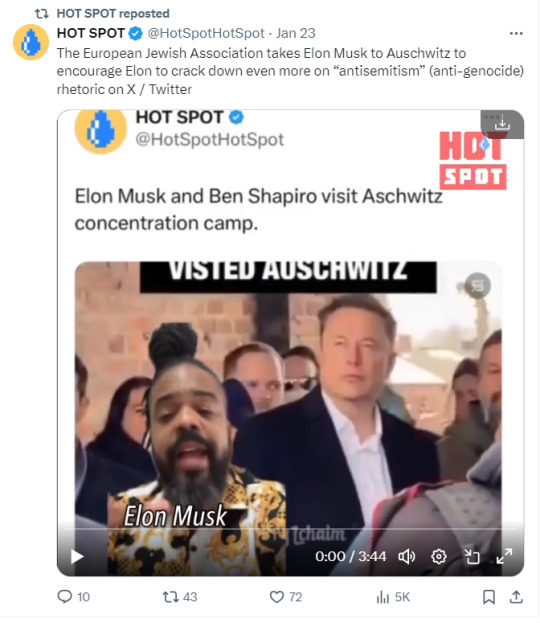
Of the up to 20% of tweets this "media company" posts or shares, many are anti-democratic or in support of dictatorial regimes.
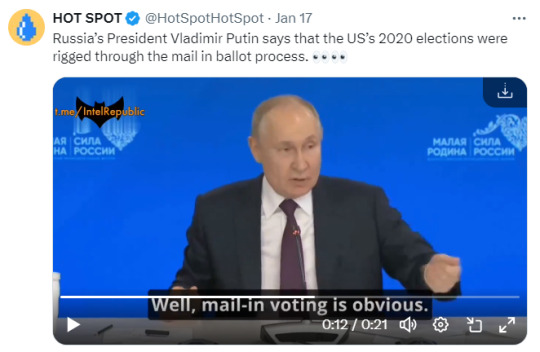
This account also amplified the words of Julius Malema, leader of the South African EFF party, as he justified the Oct 7 massacre, and demanded support for the (genocidal) Hamas and its "resistance."

Malema himself has repeatedly sang, "Kill the Boer," a song which many understand as a genocidal chant against the Boers, the South Africans of Dutch descent. This guy is a controversial figure at best, doesn't seem to have an issue with an actual genocide, and this "media company" upholds his words as if he is a role model.
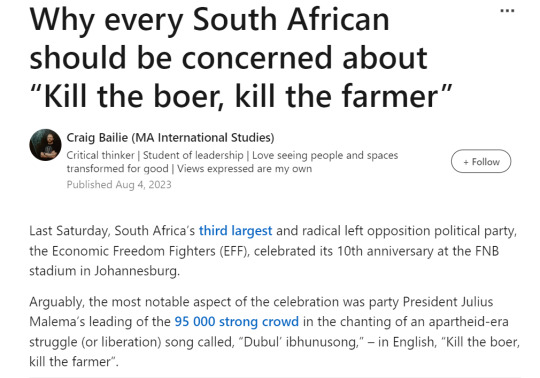
But if this account tweets Israel hate, then I guess the Tumblr user who passed the tweet along has no issue with how questionable of a source this is.
I recognized the face of the survivor. This is what it looks like in the cut off screenshot in the Tumblr post I saw:

So how did I recognize him? Because the number of anti-Zionist Holocaust survivors is SO small (around 5), and I have seen every single one of them repeatedly tokenized by antisemites so much, that I'm familiar with the name and face of each. The man in this vid is Hajo Meyer, who died in 2014. He couldn't possibly make any comments about Hamas' massacre on Oct 7, 2023 and the war in Gaza since, unless this "media company" has managed to somehow contact the afterlife. Here's a screenshot from Google, showing a recent re-upload of this vid to IG:

And here's a very brief bio, mentioning his date of death:
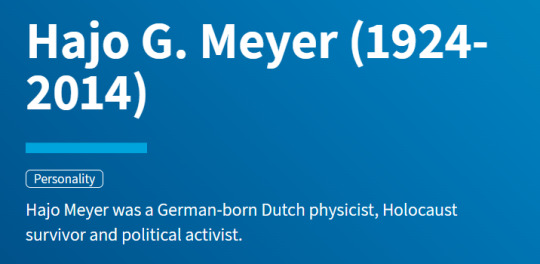
I'm guessing that "media company" didn't name him, or specify the date out of the vid, because it didn't want people to know the guy was dead, and the views he expressed were pre-Hamas' massacre.
Hajo Meyer was, without a doubt, an anti-Zionist. But would he still be using this rhetoric after Oct 7, after the biggest massacre of Jews since the Holocaust, after better understanding the kind of threat that Israel and Jews worldwide (since Hamas has tried to target Jews in European countries as well, including in the Netherlands, where Meyer lived) are facing from this genocidal terrorist organization ruling Gaza? IDK. I'd like to think he would be better than to continue distorting the Holocaust through this false comparison, but I can't say for sure, and I'm not about to claim that I do, putting words in his mouth just to exploit a dead Holocaust survivor. The fact that the anti-Israel crowd would continue to tokenize (meaning, exploit) a dead survivor like that, as if anyone could know for sure that Meyer would continue to toe the same line, just shows there really is no moral low they can't stoop to.
And here I wanna emphasize how wrong this antisemitic practice is, tokenizing Jews. Because no marginalized group is immune to the hatred spread against it, there will ALWAYS be some of its members, who will internalize and embrace poison aimed at it. There were gay Nazis (the notorious Ernest Roehm was the highest ranking one) and we also have contemporary gay neo-Nazis. So, should we use them in order to pretend that Nazi ideology is not homophobic? That it didn't harm hundreds of thousands of gay people? No, we know that the overwhelming majority of gay people suffered due to it, and would insist that Nazism IS homophobic. So, using those few exceptions to ignore (and embolden) the homophbia of this ideology, ends up being homophobic in itself. Embracing the unrepresentative few over the representative, mainstream majority of a marginalized group in "exonerating" what the group says is hateful and harmful towards it, ends up being hateful and harmful in itself.
And that's what people who only listen to the few anti-Zionist Holocaust survivors are doing. They're basically saying, "Listen to Holocaust survivors!" but they mean only the few who say what the anti-Israel movement does. All the other survivors they ignore, dismiss, silence or even erase.
They're ignoring the voices of the overwhelming majority of Holocaust survivors who WERE (and are) Zionist. Who do not agree with this distorted narrative. Yad Vashem estimates that two thirds of Holocaust survivors came to Israel at the end of WWII, and many more supported Israel even when they chose to settle elsewhere. Just recently, we had a group of 870 American survivors (along with their descendants, altogether 2,500 Jews) thank Biden for standing with Israel after the Hamas massacre. These anti-Israel haters are also erasing the survivors who were themselves targeted on Oct 7, whether threatened, kidnapped, injured or murdered (I've talked about several in my posts on this blog). This anti-Israel mob is exploiting Hajo Meyer even in ignoring that if he had been alive and present in Israel, even just to visit a friend or family member, he would have been targeted, too. These haters are ignoring survivors who said that what Hamas has done is similar to what the Nazis did (I've talked about several of them in my posts on this blog, too. All can be found in my Israel tag).
It is unconscionable, to treat most Holocaust survivors like they don't count, and only see a (literal) handful of anti-Zionist ones as if they do. And it certainly does NOT show the respect the anti-Israel haters imply survivors are owed, through the demand that we all defer to the opinion of the survivors, but ONLY the few anti-Zionist ones.
All that said, off the top of my head, here's a small number of HUGE differences between the Holocaust, and the Israeli-Arab conflict, and anyone ignoring them IS guilty of distorting the Holocaust.
-> The Holocaust did NOT start due to Jews repeatedly murdering Germans on German soil, in an attempt to keep Germans down and prevent them from establishing self rule in the German ancestral land. The Holocaust was completely unprovoked, unjustified and one-sided. Every oppressive measure taken by the Nazis against the Jews, was motivated by antisemitism, and was NOT a reaction to Jewish anti-German terrorism, that the Nazis had to protect their German citizens from. Speaking of unprovoked, unjustified and for a very long time one-sided, that describes the Arab anti-Jewish violence that preceded the establishment of the State of Israel by almost 100 years. But Jewish self-defense in this conflict, which only started about 50 years after said violence began, was provoked, was justified, was a response to what was done to the Jews first.
-> The Holocaust did NOT consist of Jews on German soil collaborating militarily with several Jewish countries surrounding Germany, with the goal of these combined Jewish armies invading and wiping it off the map, in order to prevent German self rule. Guess what the Arabs did to the Jews...
-> The Holocaust did NOT entail repeated German efforts to find a solution for how Jews and Germans could live together on the same land. In pre-state Israel, Jews did try repeatedly to reach an understanding that would allow Jews and Arabs to peacefully share (and co-exist in) the Jewish ancestral land.
-> When Jews finally started rebelling against the Nazis, they did NOT try to get as many Jewish civilians as possible killed. On the contrary, the outbreak of the most famous Jewish revolt, the one in the Warsaw Ghetto, was postponed until the Nazis entered, and the Jewish fighters believed this to be the final 'liquidation' of the ghetto (meaning, the deportation and extermination of the roughly 60,000 Jews still alive there). Only then did they fight back, because (in their own words), they did not want their decision to rebel to cost another Jew "even one hour of life." Compare that to how Hamas has been using Palestinian civilians as human shields. Or even to the Arab leadership back in 1948, which did not hesitate in risking or displacing the entire Arab population in the Land of Israel, in favor of fighting what they called "an extermination war" against the Jews.
-> The Holocaust did NOT see a single day where Germans worked en masse to try and alleviate the suffering of Jews, whether by providing them with humanitarian aid, or by moving them to areas where they would be safe from death. That's in direct contrast to Israel's efforts to make Palestinians' lives better, whether through humanitarian aid, work permits in Israel that guarantee a higher salary and better social rights, medical treatments, warnings when a terrorist target is about to be struck, etc.
-> The Holocaust was NOT supposed to end with even one Jew alive at the end of it. The Germans were going for total extermination of the Jewish people. All Jews who had German citizens were stripped of it in 1935, even before the most murderous parts of this genocide commenced. In contrast, Israel did NOT seek to kill all Arabs, there were many calls for Arabs not to flee Israel and the war which the Arab leadership had started, at the end of the war Israel gave citizenship to 150,000 Arabs who did not leave and did not take arms against Jews, and there was even an offer for tens of thousands of Arabs to return (Weitzmann presented it to the UN), if they do so peacefully. Just a few thousands accepted that offer, but those who did, got citizenship and land.
-> The Nazis were so eager to kill every Jew, that they came to the conclusion they HAD to industrialize their genocide of the Jewish people. That's why they built extermination camps with gas chambers at their core. Auschwitz alone could, on certain days, kill about 20,000 people. No Jew was meant to leave those camps alive. The crematoria were mass murder factories. ANY crime that you want to compare to the Holocaust specifically, you have to show that it includes this industrialization element. Currently, NO GENOCIDE, no matter how horrific, has. And God help us all, I hope it stays that way (this is one of the reasons why the Holocaust mustn't be distorted or minimized. We can't prevent something from happening, if we don't understand what HAS happened, and that we're trying to stop from being repeated). There is not a SINGLE thing in the history of the Israeli-Arab conflict that comes CLOSE to being an industrialized form of massacre. Even the brutality of Hamas on Oct 7, the single bloodiest day in the history of this conflict for either side, doesn't come close.
-> While there are still Jews around, meaning the Holocaust as conceptualized by the Nazis failed, it was so deadly, that it DID lead to the murder of around 70-80% of the Jews living under the Nazi occupation over a short number of years. Even more than 80 years after the end of the Holocaust, Jews have not recovered demographically. Meanwhile, the Palestinian population has increased by about 10 times since Israel's Independence War. But let's say people wanna claim that just this current war is comparable to the Holocaust. There are presently around 7 million Arabs in the territories of the Jewish ancestral land, of which about 2 million are Israeli citizens. I'm gonna go with the anti-Israel narrative for a second, which claims ALL of them are occupied and oppressed by Israel (even though they're not). In order for the ruin of Palestinians to be indeed on the same level, that would mean 70-80% of them would have to be murdered by Israel during the war. Let's go with the lower percent, so it's easier for the anti-Israel crowd to reach the number of deaths that would support their claim. To have killed 70% of 7 million, that would mean Israel would have to kill 4.9 million Arabs in this so-called "genocide." Even if we exclude Israeli Arabs, and only focus on the 5 million Palestinians living in areas where the Israeli army currently operates (imagine the German Nazis allowing Jews safety inside Germany, and only killing them outside it *eyeroll*), that would mean at least 3.5 million Palestinians killed. But after almost 5 months of this war, the number of Palestinian fatalities, as claimed by Hamas, is around 30,000 people (I'm putting aside the fact that at least 12,000 are Hamas terrorists). The gap between what is happening, and what people who make this false comparison are implying is happening, is incomprehensible.
Sorry for the length, but I hope this is helpful!
(for all of my updates and ask replies regarding Israel, click here)
#resources#israel#antisemitism#israeli#israel news#israel under attack#israel under fire#terrorism#anti terrorism#hamas#antisemitic#antisemites#jews#jew#judaism#jumblr#frumblr#jewish#ask#anon ask
252 notes
·
View notes
Text

pre-mclaren oscar piastri primer (ft. maxf, landoscar)
0. introduction
for a few months now i've been wanting to make both an oscar primer and a timeline of pre-mclaren landoscar moments, but i couldn't figure out which one to prioritize… then after some deliberation i finally realized i could just combine the two things together! so. here is an oscar-centric timeline that is mainly about his racing background, moving to the uk, and how he became acquainted with other members of the rfm pack—aka lando, maxf, and logan. i don't know whether any of this information is useful or even vaguely interesting, but i mostly just wrote it for myself and thought i'd share what i had in case anyone else wanted to check it out. please feel free to comment or shoot me an ask if anything here is egregiously incorrect; i've checked and linked as many sources as i could but it's of course possible that some errors remain :)
1. background, rc racing, early karting days
(2007-2015)
oscar piastri was born on april 6, 2001 in brighton east, a suburb of melbourne not far from albert park circuit, as the son of chris and nicole and to-be oldest brother to 3 younger sisters. a love for all things automotive ran deep in the piastri family: both of his grandfathers were mechanics and his father had also co-founded his own vehicle diagnostics software company, hp tuners, aka oscar's sponsor throughout his racing career. thanks to his father's business, oscar's family was objectively well-off and managed to contribute a fairly substantial amount of support toward his junior career, but they also weren't swimming in cash by multi-millionaire motorsport standards either.
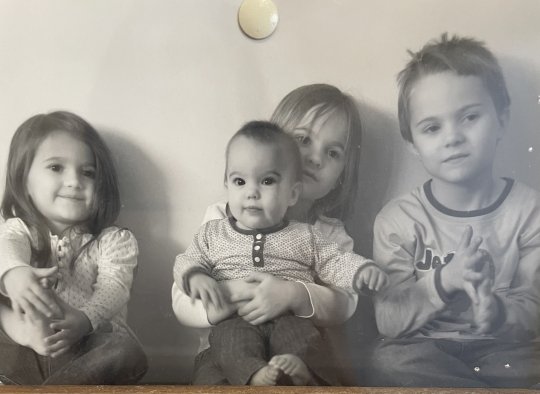
(L-R) mae, edie, hattie, and oscar, from nicole's twitter — each sibling is ~2 years apart (source)
while most drivers on the current grid were introduced to motorsport through go-karting, usually at or before the age of 7, oscar's path to single-seaters differed slightly. he first developed an interest in racing via remote-controlled cars at the age of 6, when his father brought him a monster truck as a souvenir back from a business trip in america. oscar began racing them that same year, eventually moving to safer electric track vehicles and even winning the second class of the national titles in 2010, at the age of 9. he was so small then that he often needed to stand on a milk crate to see the cars on track, and the next-youngest competitor at the time was twice his age. (source)
youtube
oscar on the podium at age 8 (nov 16, 2009)

oscar with his father chris, who often competed alongside him in a separate class (dec 21, 2010)
by 2011, oscar and his father were seriously considering his potential of pursuing rc racing as a viable career path, but things changed when he was introduced to karting via a friend's daughter in the rc community and his aspirations slowly shifted toward racing from inside a car. oscar was an unsurprisingly sporty and competitive child growing up; he'd played some cricket and aussie rules football and knew that all he wanted to do was race professionally, full-stop, at the time thinking along the lines of australian racing categories like v8 supercars. he was still competing in remote car racing as late as 2013, but he began karting seriously within australia in 2014, placing respectably in the junior categories of several regional karting series against relatively senior and more-experienced racers, and even going to france for a one-off event where he finished on the podium of the iame international junior x30 final. this outing affirmed his potential to his father and motivated the two of them to split time between australia and europe in 2015 as they juggled his karting future; plans for two more european events that year fell through, including the cik-fia world championship at the kfj level (which logan sargeant would go on to win), but at this point they were officially looking to take his career to the next level and commit fully to european karting in 2016.
this is when ricky flynn (and the hypothetical idea of lando norris!!!) comes in. before we get into rfm and karting professionally in europe, it's important to note that the defining aspect of landoscar's junior careers is that their pathways never once intersected. in fact, they don't even seem to have met properly before oscar entered the f1 grid as alpine reserve, although they'd spoken over social media and oscar was familiar with several people around lando's life—for example, maxf, logan, guanyu, and even lando's older brother oliver, who had also raced for rfm.
in short, you could say that landoscar's biggest hindrance was their parallel excellence. oscar was good enough to catch up and even surpass everyone else at lando's level, but lando remained untouchable throughout the years. oscar is only 1.5 years younger than him, but their f1 careers are offset by 4 years (2019 vs. 2023 debut) because of exactly two things: oscar's 2022 gap year in alpine and his two attempts at formula renault eurocup. on the other hand, lando sped through all of his junior categories in blistering fashion, falling short of the championship only once: the year he placed 2nd in f2 behind george russell. this is significant because many talk about the clinical nature of oscar's rapid single-seater ascension and three b2b2b victories (still very impressive, especially given his limited karting career!), but all of that speaks equally to the illustrious nature of lando's junior success and the sheer magnitude of faith placed in him as mclaren's "golden boy" coming up the ranks. to put things into further perspective, lando was teammates with maxf and jehan daruvala at rfm until 2014, jehan competing in the same class and max one below, yet by the time oscar was racing max and jehan—in f3 in 2020 and f2 in 2021, respectively—lando was already into his 2nd and 3rd years of f1. here's a chart that hopefully makes a bit more sense:
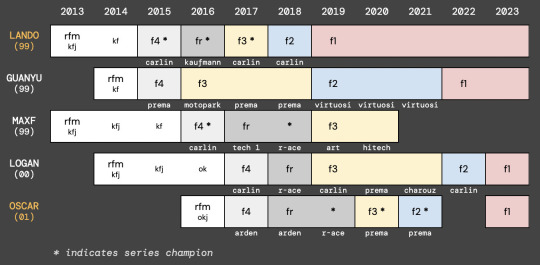
majorly simplified timeline showing lando, guanyu, maxf, logan, and oscar's junior careers + the karting classes they primarily competed in each calendar year. maxf did not complete his 2nd f3 season and many of them contested multiple/different formula renault series, but this is just a rough overview of their feeder series experience.
2. moving to europe, rfm, regional formulae
(2016-2019)
back in australia, oscar was a member of the oakleigh go-kart racing club and being actively mentored by james sera, a multi-time australian karting champion and fa kart dealer who worked with young karting talents alongside his cousin david. in late-2015, he presumably helped oscar and his father reach out to ricky flynn, who ran ricky flynn motorsport (rfm) and whose team was at the time enjoying exorbitant success in the karting scene; lando had won the world championship at the kf level the year prior, and logan would soon clinch the kfj title in 2015, results which further drew oscar's interest toward the team. ricky flynn agreed to take oscar on and have him and his dad move out to europe, and by november 2015 oscar announced on social media that he would be joining rfm the next year. in january of 2016, he and his father moved to hertford, uk, so that oscar could begin a 100-day karting program and travel extensively around europe to attend races. this is where he met logan sargeant, who was in his final year on the team but competing a class above, now at the ok (previously kf) level. oscar himself was only competing in the okj class.
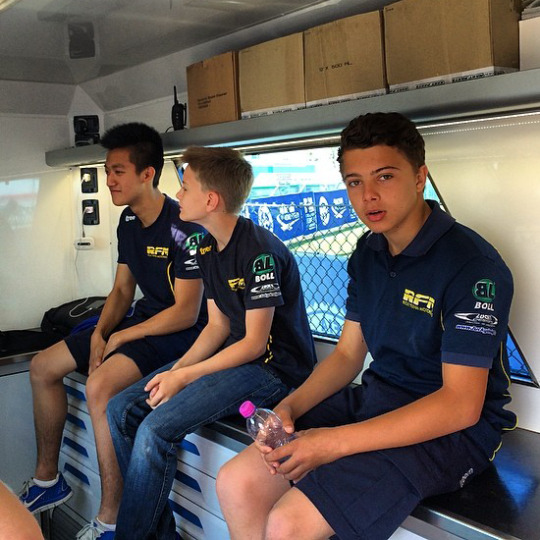

not oscar-related, but as you can see guanyu, logan, and maxf were already acquainted before oscar and logan met, since the three of them and lando had been in rfm together as of 2014 — (may 11, 2014) & (feb 6, 2015)
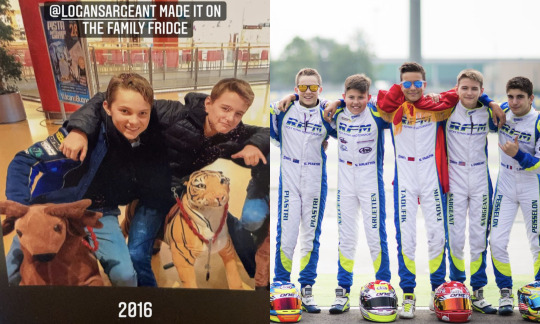
oscar and logan in 2016
in an interview published on june 7, 2023, oscar reflected on leaving australia and committing to his racing dream, saying:
"i think if there was a turning point, it was probably when i started finishing towards the front in australia, and i started winning a couple of races here and there and finishing in the top three of championships and stuff, and then went to europe and fully committed to going down that route. [...] there's obviously a very big commitment at that point when you move halfway across the world without family and stuff. so i knew at that point that i really wanted to become a professional because, firstly, that's what i want to do anyway, but, secondly, now i'm sacrificing seeing my family, and stuff like that to be able to do this — which was a sacrifice i was more than willing to make."
like the majority of oscar's karting career, his time with ricky flynn can primarily be summarized as decent. none of his performances were particularly stellar, and in november 2016 he placed 6th in the fia world championship final behind the likes of victor martins and théo pourchaire (he mainly competed against guys like them, dennis hauger, caio collet, etc… once again logan was a class above and lando/maxf had already graduated to single-seaters), but he showed promising racing foundations and a great capacity for improvement, especially given that he'd moved to europe the same year and was still adjusting to life and racing on the opposite hemisphere. about 6 months into his new karting venture, oscar had settled in reasonably well and his father decided he would return to australia to continue on with his life, so they made the joint decision that oscar was to begin boarding at haileybury's uk campus and continue racing in europe entirely on his own. uk and australian school years are misaligned, so my personal understanding is he moved to europe after finishing year 9 in australia, attempted online school/took a few months off (he says he did online coursework here, but mentioned here that he was out of school, so it sounds like it must have been a very half-hearted effort…), came back to australia over the uk summer to do some more karting, then began boarding in september 2016 as a year 10 student. he spent ~4 years there and eventually received his a-levels in 2020, except his final year was disrupted by covid and he never sat his exams. (blog post mentioning his a-levels + btg transcript excerpt about his exams; his website says he attended haileybury from 2016-19, but i think this mainly encapsulates his boarding period, as he was still doing remote work in april 2020.)
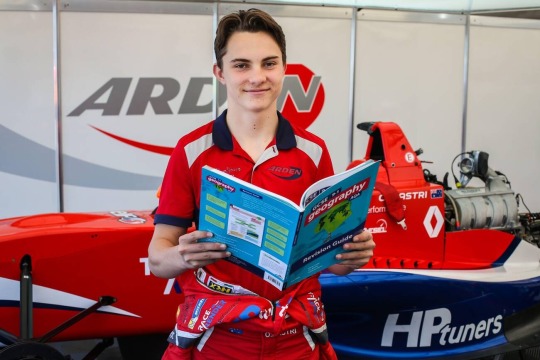
oscar in f4 with his gcse revision guide, 📸 sebastiaan rozendaal (may 20, 2018)
2016 is also when oscar began his well-documented super-liking of several of lando's social media profiles. i think understanding oscar's time in rfm and his extremely british single-seater origins helps better paint his history with lando and maxf; my personal understanding of pre-mclaren landoscar is that while oscar never formally met lando or maxf during his karting days, he knew of them quite well through rfm and thus followed them on instagram/twitter after moving to the uk. of course, oscar has a fairly active social media presence in general, so young oscar quietly liked instagram posts and tweets from many different people, but i do feel compelled to note that in the early days he liked lando, maxf, and logan's posts with seriously impressive frequency compared to anyone else on the grid (or anyone in general, really); after creating his twitter account in may 2016, some of the very first tweets oscar liked were from maxf, and he also liked a multitude of mundane lando tweets from 2016 until… today, while on the other hand he didn't start liking george's tweets—another similarly-aged young british talent—until late 2017. (he does have some fun george-admiring moments though, but that can wait for another time!) outside of rfm, other people oscar was familiar with during his early racing years were british f4 teammate ayrton simmons, to-be series champion jamie caroline, and old australian karting friend christian pancione, who appears to still be one of his best mates (if not his best) as of today. fun fact is that christian raced for the carrera cup as a support event to the australian gp in 2023; here's oscar allegedly checking the quali live timing at lunch during his own media day.
so, to conclude, oscar's early lando focus basically traces back to the motorsport path he took at the behest and guidance of his early rfm connections in the uk. the thing is that despite growing up in australia and vaguely admiring several aussie drivers in f1 as a child (read: mark webber and eventually daniel ricciardo), oscar has never had a specific driver he consistently mentions when pressed for his racing "idol," likely since his personality inherently resists idolatry and he instead views successful people more as actionable benchmarks or reference points for self-improvement rather than as unattainable paragons of accomplishment. as a kid forced to grow up almost entirely on his own, the majority of his racing aspirations were molded independently in the uk—he completed his karting career in the uk, boarded at haileybury for 4 years (fun fact: other drivers to attend include jehan, callum ilott, and clément novalak; callum was a few years above oscar and finished school in 2017, but the two would later become quite talkative over social media anyway), raced in british f4, became a brdc member, contested eurocup under a british license and therefore had the british flag raised and british national anthem played during his wins, stayed in the uk even at alpine since the factory is based in enstone, etc. oscar basically moved to the uk from australia without having really met anyone significant in the racing scene (other than jack doohan, or more importantly jack's father mick, but jack is younger and did an extra year of karting) and pretty much didn't have anyone specific to "look up to" at the time. oscar's first acknowledgement of lando's online existence was in december 2015, when he liked one of lando's instagram posts prior to moving to england, so it can be assumed that lando basically functioned as his most accessible reference point in the junior ladder as a 14 year old dipping his toes into the european racing scene for the first time. that is my highly subjective analysis of the situation!
select quotes re: oscar's inconsistent responses to his motorsport "hero" (or his favorite driver / a driver he looks up to in general):
(f1fs; mar 9, 2022) "i started watching f1 in… 2009 was the first season i properly watched. so when brawn came in, obviously mark was the only aussie on the grid at that point, so i was kind of naturally going for him. then joined by daniel, so obviously going to support the aussies, but i think watching lewis has been nothing short of spectacular, and a very good role model. [...] i think when i was first watching, i supported mark, but, you know, and i hope he takes no offense to this—vettel was winning everything at that point. so i was supporting mark, but vettel was doing most of the winning. i think now that i understand more about racing though, i would say [the driver i look up to the most is] lewis, mainly. the way he goes about things on and off the track is quite exceptional."
(mcl youtube; mar 29, 2023) sporting idols mentioned: ayrton senna, alain prost, michael jordan (see also ultimate athletes list)
(p1; aug 10, 2023) "i would say i never had like one specific idol. when i was growing up watching mark webber was at red bull, and obviously being australian, red bull being very quick at the time, i kind of naturally followed him. i mean—even like some of the guys in the junior ranks above me. like lando was always kind of two, three years above me, winning… most things on his way up. so i guess kind of him in some ways?"
(eff won; dec 4, 2023) "i don’t really have like one specific [idol]. i think what lewis has been able to do in terms of getting to seven world championships was incredibly impressive. i think what max is doing now is also very impressive…"
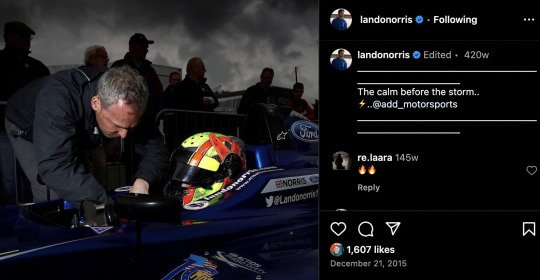
the first lando post oscar liked on instagram (dec 21, 2015)

the first maxf posts oscar liked; instagram (feb 26, 2016) & twitter (may 9, 2016)
anyway, back to british f4! despite his initially unconventional foray into motorsport, oscar's journey progressed in a much more orderly fashion once he stepped up to single-seaters. his actual debut was in f4 uae, which he ran 3 rounds of between 2016 and 2017 (another fun fact: this is where he briefly acquainted himself with mclaren indycar driver david malukas, who would later recall him being very intelligent and whom zak brown allegedly spoke to oscar about before appointing to their indy team). after cutting his teeth on actual car-racing for the first time, oscar decided against moving up to the ok class as he felt confident in his ability to be competitive in single-seaters. his first full season was therefore the 2017 british f4 championship, during which oscar signed with arden while logan went to reigning champions carlin (lando had won with them in 2015, then maxf in 2016). oscar made his way to the top step 6 times in the season and placed just barely above logan for 2nd in the championship, finishing behind the considerably more experienced jamie caroline. arden was also founded and is currently owned by red bull team principal christian horner, so it was during oscar's time there that christian took note of and interest in his talent; oscar reportedly did a few runs in the red bull simulator but was passed over for joining the academy, which christian later voiced regret on. (source)
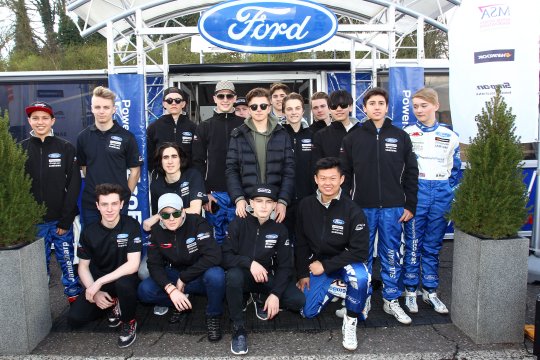
maxf, logan (center), and oscar (to max's right) on a day maxf was visiting the 2017 british f4 grid (april 11, 2017)
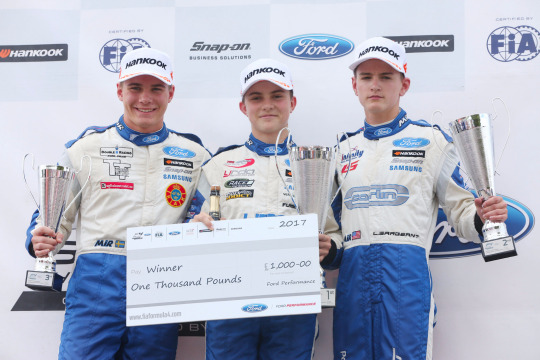
linus lundqvist, oscar, and logan on the podium at snetterton (jul 30, 2017)
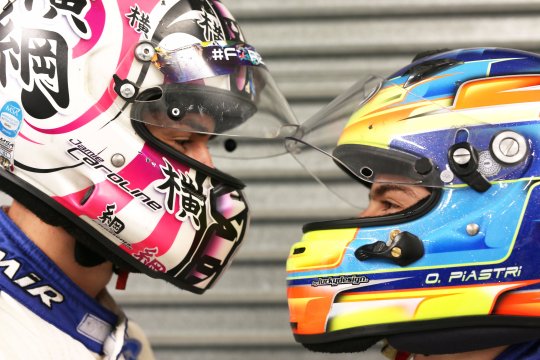
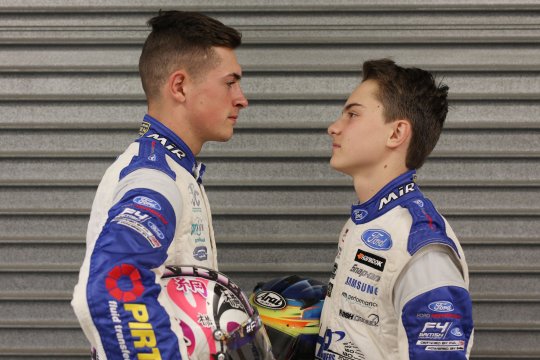
jamie and oscar, who were… er, mathematically in the main championship fight. for some reason they made them take these photos (sep 30, 2017)
after a successful f4 outing with arden, oscar returned to the team for his first season of formula renault eurocup in 2018, a renault series that ran in its specific configuration until 2020 before merging with the parallel regional series frec to become what is today known as freca. this season proved to be less competitive for oscar, as arden was relatively inexperienced in this series and oscar's three teammates were afflicted with what can colloquially be referred to as a "skill issue," making it difficult to collectively develop the car throughout the season. (blog interview) the series was thus returning driver maxf's to lose, who at the time was racing for reigning champs r-ace with teammates that included oscar's fellow rookies logan and victor martins.
despite the unideal environment, oscar managed to prove his worth by placing a respectable 8th in the series, scoring 110 points as a rookie driver and capping the season off with 3 podiums and a top-finish of 2nd place—a jarring contrast to his teammates' joint total of 12 points. this result attracted the attention of r-ace and granted him a seat with them for the 2019 season, at which point maxf and logan both graduated to f3. thankfully that wasn't too much of a concern for oscar since he'd always intended to do two seasons of eurocup, and now he finally had a chance to win the first serious championship of his racing career with an established racing outfit.

oscar, max, and yifei ye on the hockenheim r2 podium (sep 23, 2018)
[full gifset]
oscar's second season of eurocup is when he truly started proving himself as a driver, or at least to the people whose names, money, and opinions mattered around the paddock. his main competition in 2019 was again victor, who was now racing for mp and had been made a member of the renault sport academy back in 2018 after a strong performance in french f4. despite a close title fight, oscar managed to hold him off for the championship in the final race of the season, kicking off what would soon become an impressive string of consecutive single-seater series titles. even sweeter was the fact that all eurocup champions were awarded a renault sport academy spot that could be left or taken as they pleased, and of course—while the finances weren't nearly as impressive as alpine would later proclaim in their baseless smear campaign—oscar's connections in the racing world were limited as an australian driver almost exclusively managed by his father, so he gladly accepted the offer for the many venues of support renault presented to him.
see also: bby oscar briefly mentioning lando after winning eurocup in 2019 (@ 1:10)

oscar being lifted by his team (r-ace) after placing 4th in the abu dhabi finale and winning the title by 7.5 points
3. renault sport academy, lockdown, f3
(2020)
many things happened in 2020. one: oscar became an official member of the renault sport academy, joining the likes of max (who'd been picked up on merit after winning british f4 in 2017), guanyu, christian lundgaard, caio collett, and fellow new recruit hadrien david (victor had been strategically demoted after oscar's win because renault is a notoriously unserious organization, but again this is not the post). two: by the time oscar was ready for f3, moving up the ladder proved to be exorbitantly expensive, and he realized he needed better funds and managerial support to sort his career out. he'd been offered a spot in prema's f3 team by team-owner rené rosin at the end of his eurocup season, who'd named him for the post-season test before the championship was over and stressed that the spot was his no matter where he finished. (source) prema is unquestionably one of the top—if not frequently the top—teams one can drive for in most junior series (though there is also somewhat of a self-selection bias; if you ask oscar he is not a significant beneficiary of prematax!), having absolutely demolished the f3 competition that same year and achieved a clean sweep of the drivers' standings with rob shwartzman, marcus armstrong, and jehan at 1-2-3 consecutively. oscar completed post-season testing with them in spain alongside to-be teammates logan and fred vesti in october (source), before confirming on jan 26, 2020 that he would be joining them for the f3 season as a renault junior.
so, where does mark webber come in here? apparently mark's trainer from red bull and wec had also been oscar's trainer since 2016 (i'm pretty sure this is australian physiologist simon sostaric), and it was through their joint connection that oscar was introduced to mark. according to mclaren's 2023 season preview, "the pair hit it off, and webber took his countryman under his wing," signing oscar to jam sports management, aka the management agency he runs with his wife ann. mark's support would become a major factor in helping oscar progress through the feeder ranks and establish himself in f1, mainly because he had actual connections and could help oscar network with sponsors and negotiate his way during future signings. of course, more on this later.
as an aside, here are a few things mark has said about oscar:
"he’s got that white line fever when he puts his helmet on and turns into a different character, which is sensational." (mar 1, 2020)
"one of oscar’s biggest strengths by a mile, compared to everyone he is competing against — and this will be a huge string to his bow when he makes it to f1 — is his composure. he has immense levels of composure. [...] if you are weak mentally you won’t make it. he was on his own from an early age. he did brilliantly with his studies. but the racing disease would not go away, he wants it very much." (sydney morning herald; dec 11, 2021)
"he’s a prost, mate. he’s such a thinker and so calm. at first i thought i needed to inject a bit of urgency in him, but actually no, he’s got his own frequency. that’s just where he is." (the race; oct 7, 2023)

estimates provided by chris piastri on the cost of oscar's junior career, stressing the million-dollar commitments of running a single season of f3 or f2 (source)
anyway, back to the chaotic events of 2020. i think something that's good to keep in mind when discussing oscar's time in the renault sport academy is that he was actually a relatively new recruit, as in he only participated in a single training camp with the other juniors in 2020 and most of them (max, christian, guanyu, the temporary ghost of victor) already knew each other before. oscar essentially met with renault's factory team in early 2020, filmed promotional material with other juniors in january before attending the season opener together in february and then heading to winter training camp later that month, after which he and max left early for f3 pre-season testing in bahrain on march 1—a blessing in disguise, seeing as caio, hadrien, and christian remained behind and would soon be stuck quaranting in a hotel in tenerife—then briefly spent a week at school before returning home for what was meant to be a quick pit stop at the australian gp, which at the time had yet to be canceled.
then, of course, lockdown happened.
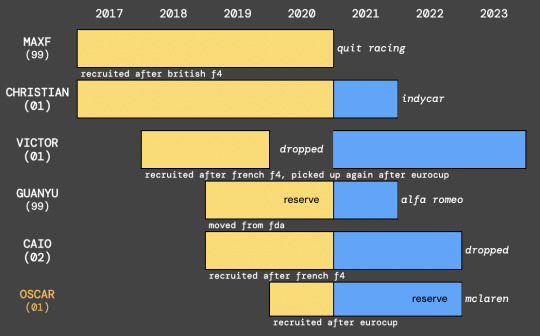
simplified breakdown of renault junior stints, notably showcasing the academy's struggles to meaningfully promote any of its juniors
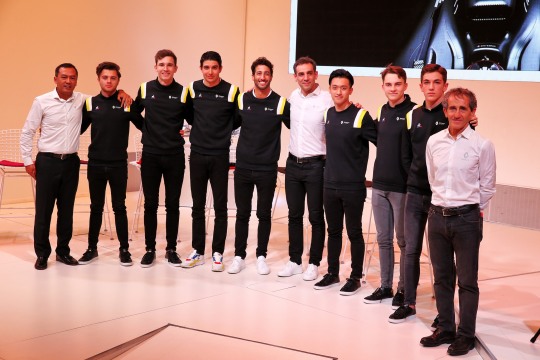
oscar at the 2020 renault season opener alongside then-academy director mia sharizman, then-tp cyril abiteboul, alain prost, f1 drivers esteban ocon and daniel ricciardo, and the other academy juniors: fewtrell, lundgaard, zhou, david (feb 12, 2020)
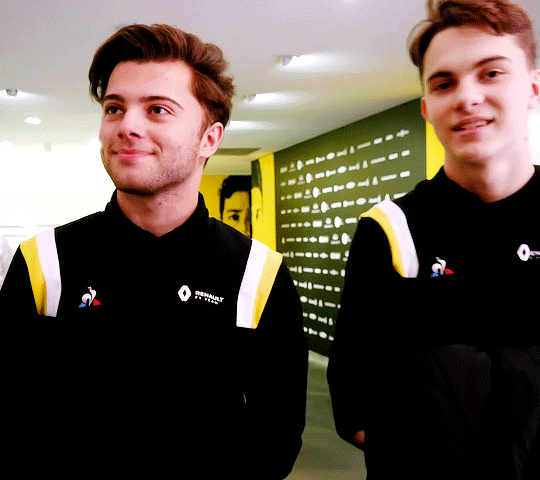
oscar and maxf behind the scenes of the same event (feb 12, 2020)
stuck in australia for three months, oscar would end up participating in two fia virtual races, one for f2 and another for f1 (jun 7, 2020). a fun landoscar tidbit is that he finished 5th in the virtual gp right behind lando, so they technically had raced each other before 2023, depending on... well, whether you count a 2020 sim race wherein george russell and alex albon lead the pack as a real race. nevertheless, this was a time when drivers were becoming much more active online, seeing as streaming was the best way to keep their images relevant and connect with fans, and despite oscar expressing little interest in streaming on twitch he would still experience a considerable uptick in his online activity and twitter reach that year.
racing resumed on july 4 at the red bull ring in austria; oscar had been granted an exemption to travel to the uk and complete a 2-week quarantine back on may 27, a reassuring indicator to the motorsport world that the f3 season would run after all. now that he no longer had to attend school, having received 2 b's and 1 c for his maths, physics, and computer science a-levels, oscar relocated from hertford to oxford in june to be near the renault facilities, which he visited nearly every day to train at, and began living independently (as in in a flat) for the first time since 2016, rooming with fellow renault junior caio collet.
as i said before, this season is when oscar's online presence and "memeability" began to really conceptualize, enabled primarily by the fact that he was a) finally living outside of a school dormitory, and b) now, of course, signed at prema, a team notorious for its social media visibility, literal family atmosphere, and frequent youtube pandering. according to this f3 article, his twitter followers jumped from 795 at the start of the season to 11.6k by the time he won the championship, an audience built significantly off the self-deprecating string of jokes he used to tweet regarding drs and general reliability issues faced throughout the season.
what i guess i want to touch on here is how oscar's online presence has always been concentrated around the bare fundamentals of his personality: dry humor, candid words, sparing emojis, a few humorous photos detailing the mundane reality of his everyday routines, and at most the occasional inopportune meme or reaction gif (#thepiastri 🤷♂️, f2 in baku, jetpack guy, so on). he's bantered frequently with callum on twitter and near-obsessively liked memes, videos, and other updates lando shares with his audience, but he also has seemingly little interest in building up his own "brand" the way lando so smartly has with ln4 and quadrant, and quite frankly seems viscerally incapable of wanting to engage one-to-one with fans or otherwise leveraging the popularity of his material image. basically what i like to say is that oscar enjoys being adjacent to "lad humor" and will happily enable it, but he really has no interest in being the one to initiate it himself!
"there's some things you want to share, some things you don’t. in today's age and sort of having the profile that us drivers do, we kind of just have everything shared,” piastri said. “but (social media) can be used for good, certainly within the profiles that we have. but in some ways, it can be negative, and there's always going to be people out there that don't like you for being you.”
piastri tries to write as many of his posts as possible, and he checks those written by his team to be sure they sound authentically him. (the athletic; jun 29, 2023)
along these lines, oscar does enjoy the spotlight, only he seems to prefer it concentrated in a specific lens toward a specific productive end. he's endlessly capable of seeing the objective upside of a situation, joking after he was made a meme in baku following his f2 sr1 collision that he was all for it if it got him popularity. after his eurocup championship he also said: "i think everyone loves a bit of spotlight on them. i think that's just human nature, so a bit of attention's always nice." which is interesting to me!
but back to racing. this season would unexpectedly become two things: maxf's last competitive season in motorsport—especially disappointing considering that he'd gone into the championship expecting to put on a second-season title charge, instead failing to gel with the hitech team to the point that each increasingly poor weekend made him spiral mentally—as well as oscar and logan's last season racing against each other before f1, since logan would later encounter financial difficulties that left him stranded in f3 as oscar catapulted himself to f2 victory. 2020 was obviously a weird season in general because of covid and the gap from pre-season testing, so it also meant that oscar had gone into the season fairly rusty; he managed to win the first race of the season, but on top of his drs rollercoaster he did struggle with middling results in qualifying and was met step-by-step throughout the championship by logan.
maxf's last race in f3 was the barcelona sprint race on august 16, with three rounds left to the end of the season. he dnfed in an unfortunate first-lap incident mere moments after oscar charged his way up from 5th on the grid to the front of the pack, where he would eventually breeze his way to victory and pull himself near-level with logan for the championship lead. i recognize that this is an oscar post and not a maxf post, but i think their time in f3 during an extremely isolated and covid-affected period speaks to both an interesting dynamic between them (the little kid who always lagged a series behind you suddenly beating you on merit) and their respective temperaments toward racing. while at renault, max reportedly lived with jack aitken during the week but would return to his family home on weekends, so it makes sense that he struggled to adapt when covid hit and drivers were collectively forced into very regimented sporting bubbles. mark webber, who worked for channel 4 as a commentator and had access to the f1 paddock, basically couldn't see oscar in person and instead spoke to him over the phone every day on race weekends. maxf said of his decision to quit:
"normally [...] i’m able to stay calm under pressure and i don’t let many things get to me but when you have a bad qualifying result and you see guys up there that you know you’re capable of beating, it definitely takes a dig at you inside and it’s been a lot to process throughout the year." (source)
while then-academy director mia sharizman, who worked closely with the renault juniors, spoke of oscar's inherent propensity for independence and how he adapted well to the pressures of living on his own:
"if you look at oscar piastri, he has been living on his own, [away] from his family who are in melbourne for the past five to six years. because he has been living on his own in boarding school, he learns how to live on his own, and he thrives in that. we have to force him... 'have you spoken to your father?!' it's just things like that, but he thrives in that. that's why he thrived in those weekends racing. he loves being on his own without anybody.
on the other hand, we had max fewtrell, for example, who can't – he couldn't survive the 11 weekends racing, because he always needed his family to be around him. so those are the things that suddenly you see and, i think that that we see now, after a few years a driver who is quick, a driver who has the talent, and then the driver who is stable." (source)
2020 is also when lando and oscar spoke to each other on twitter for the first time. yay! after lando went semi-viral for having a meltdown over a hornet on three separate social media platforms, oscar first joked with him about it on august 24 (this was incidentally also the day maxf announced his functional retirement, which oscar liked as well 😭), before referencing the incident again a few weeks later in september.

(aug 24, 2020) / (sep 10, 2020)
outside of drs tweets and trying desperately to banter with lando norris, oscar's popular tweets at the time included several food-related mishaps and home appliance tragedies. while this isn't actually a lando moment, he was also slandered by the LN4 twitter account a month later on october 17 for reasons that remain a mystery, resulting in this set of interactions:

(oct 17, 2020) / (oct 19, 2020)
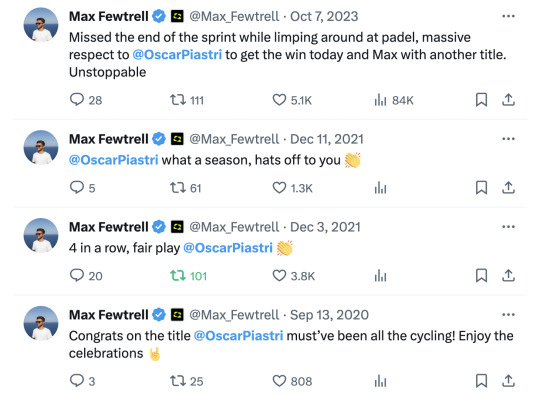
bonus: maxf's tweets @ oscar (when you aren't close enough to just text him.......)
but back to f3. similarly to his second season of eurocup, oscar would go on to clinch the title in only the final race of the year, this time even more stressfully—he never got pole that season and won arguably off of consistency, benefiting from errors and unfortunate collisions involving his primary competitors. after a hectic qualifying and string of contentious grid penalties set for the before-last round in monza, he began the feature race 15th on the grid but put on an impressive performance to finish on the podium, buffing his points lead after logan was tapped by clément and put out of the points. he, logan, and fred all dnfed in race 2 (read: the novalak pendulum swung away from oscar's favor to maintain stringent cosmic equilibrium, while logan and fred threw away a points opportunity with a teammate4teammate love tap), and oscar went into mugello with only an 8-point lead over logan and a 24-point lead over pourchaire. this weekend proved equally hectic, as is frequently the case with f3 racing standards, but in short oscar and logan entered the final sprint race level on points, with théo approaching terrifyingly near in their rearview mirrors. logan was unceremoniously taken out of contention on the first lap after contact with zendeli, and oscar managed to squeak his way to 164 points in the championship by placing 7th in the race; théo finished 3rd, with 161 points, two positions away from claiming both the race and the championship title.
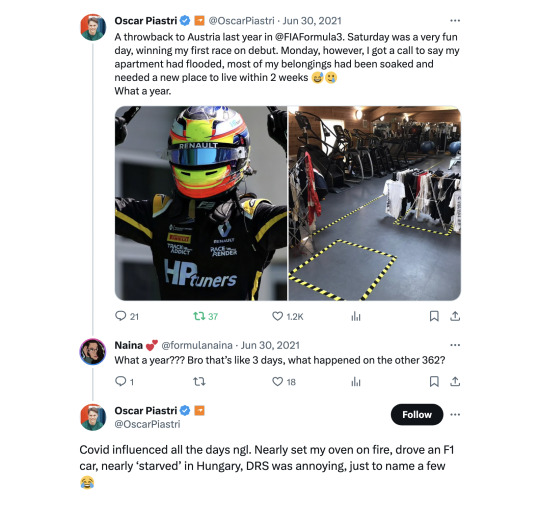
a succinct summary of an eventful season! (posted jun 30, 2021)
despite winning the f3 championship in far-from-dominant fashion, oscar's career was now steadily on an upward trend. on october 30 he was rewarded with a private test in the r.s.18 at bahrain alongside christian and guanyu, and a month later confirmed that he would be racing for prema again in f2 (december 1, 2020). as a rookie f3 champion there was a moderate amount of interest in him, but no one really expected him to carry home the f2 title on his first try and so one of the main favorites going into the next season was his second-year teammate and 2019 f3 champion rob shwartzman.
4. f2, alpine reserve duties, #piastrigate
(2021-2022)
at the start of 2021, fernando officially took daniel's place at renault and the team rebranded itself as alpine, parting ways with team principal cyril abiteboul and functionally replacing him with new ceo laurent rossi—part of a no-tp management structure, frankly a self-evident infrastructural faux-pas from a million miles away. the renault sport academy was then also renamed to alpine academy; again i know that this is an oscar post so i won't get too into the details of Alpine Being Alpine, but understanding how the academy functioned does help better contextualize the inevitable unfurling of piastrigate.
the main issue, really, would always be laurent rossi, or at least the values laurent rossi had been hired to represent and which he willingly peddled during his controversial tenure at alpine. after rossi's appointment it was reported that "the renamed alpine academy was now being tugged in two directions between director mia sharizman's ideal as a creator of future f1 drivers and alpine's chief executive officer laurent rossi's commercially-led preferences." (source) mia directed the academy from january 2016 until may 2022, and had been the one to restructure its recruitment process by demanding better funding and robust testing programs to cyril:
"when we first restarted the team in 2016, it was, we didn't even have a two-year-old car program at that time. we had to use a 2012 program using the [lotus] e20. [...] then in 2018, i went through it, and i said to cyril abiteboul, "look, let's try and do this." we needed financial resources. i needed a head start with financial resources to kick start the program whereby you entice drivers, and you offer [a place] to the academy drivers. it was more to see how they are... it was more of an evaluation process... that was what the first idea was. then we developed the program to develop the drivers to suit their formual 2 program." (source)
(note: mia also believed that 2020 was a disappointing year for all of his juniors save for oscar's performance in f3, which is a whole other thing. but rossi's greatest shortcoming was that he had singular, insulated vision, and he resisted any external input to the detriment of reactionary business decisions, a fact that alienated alain prost and soon led to his exit from the outfit in 2022. not a good look!!! prost would later call rossi "the best example of the dunning-kruger effect, that of an incapable leader who thinks himself able to overcome his incompetence with his arrogance and lack of humanity toward his troops." 🤌)
so basically, the cracks of mind-boggling incompetence within the team's leadership structure were long evident. on a brighter note, oscar's 2021 f2 season would quickly become his strongest single-seater contest ever (f1 youtube has a good summarizing video of his season, if interested); because of covid, f2 was experimenting with a three-race format this year in which quali set the reverse grid for sr1 and sr1 results then set the reverse grid for sr2, which essentially meant high qualifiers were rewarded for simply maintaining composure in the first sprint and running cleanly in the top 10 in order to secure a favorable grid spot in sr2. oscar adapted well to this format, building off his reputation of smooth, consistent driving on top of slowly improving his qualifying results over the course of the season, finally breaking through with his first feature-race win in monza.

oscar with mia sharizman
this is also around the time when lando mentioned oscar in official f1 media for the first time, reading off a question about him to daniel in an interview posted in october:
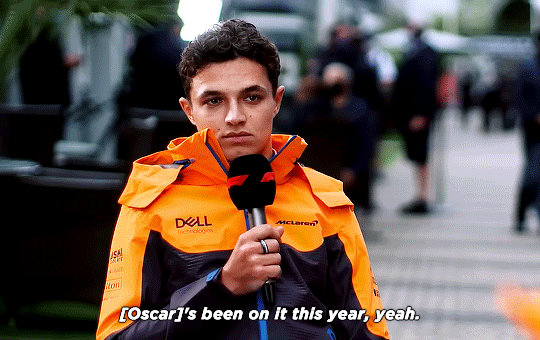
"this one's not even about formula one. it's about oscar piastri. oscar pias-tree! [...] he's been on it this year."
— (full video) (oct 1, 2021)
of his own f2 campaign, oscar said:
"i thought that i could challenge for race wins, but i probably wasn't expecting to be so consistently at the front. consistency is something that i’ve had as a trait throughout my career, and i was expecting to be consistent in my results this year — but maybe a bit lower down!" (source)
not only did he end up being consistently at the front, he became virtually unstoppable in the second half of the season. on december 11, oscar clinched the title in abu dhabi with two races to spare, ending the season with 5 consecutive poles and 4 consecutive feature wins, 60.5 points above his previously-favored teammate in the standings. #notbadforashitqualifier!
by now oscar was a hot commodity in the paddock; the only problem was that alpine didn't really care, mainly because rossi had enthusiastically re-signed ocon to a three-year deal in 2021 and held zero intention of actually promoting any of its juniors to one of the race seats, plus the one open spot at alfa romeo had instead gone to guanyu and his considerable financial package (though oscar has always been vocally defensive of guanyu's appointment to his detractors). instead of moving to another series, such as indycar or super formula, oscar recognized that he'd proven everything he needed to prove within the feeder system and opted to remain on the grid as alpine's reserve driver, mainly so that he could embed himself in an f1 team environment and—most crucially—avoid being left "out of sight, out of mind," because once you go to america you usually don't come back.
i'll keep the rest of this post brief since i feel like everyone already knows What Went Down, but a quick highlight for fellow landoscar enjoyers was the 2022 australian gp on april 10, during which oscar accompanied rosanna tennant for the post-race show and awkwardly participated in a chaotic lando & alex interview. as far as i know, this was landoscar's first time interacting on-camera!

o: "i haven't raced either of them, no."
l: "not yet!"
o: "not yet. hopefully soon."
— (full video) (apr 10, 2022)
then silly season started, and everything was thrown into disarray when sebastian vettel announced his imminent retirement and fernando subsequently took his place at aston martin; alpine scrambled to recover from this blindsided move and prematurely promoted oscar to an f1 seat, to which oscar eventually posted The Tweet—claiming he'd never signed a contract with alpine and would not be racing for them in 2023, thus kicking off #piastrigate. or the piasco, or whatever you prefer to call it.
here's a good article that properly summarizes the crb ruling, but tl;dr: mclaren and alpine had come to an agreement back in march to loan oscar to mclaren's stable of reserve drivers after daniel contracted covid; mark webber, who was close to andreas seidl from their time at porsche in wec, quietly negotiated a contract with mclaren for 2023 that oscar would then sign on july 4, which was reportedly initially a reserve deal with an upgrade clause to a full-time drive given a dr buyout; alpine's legal team turned out to be essentially one overworked legal director who mishandled the situation thanks to a lack of organizational support, while a concrete williams deal never actually existed no matter what people continuously allege, and any proprietary right to oscar's services that alpine purported to have for the 2023 season would soon be voided by crb rule on september 2. in other words, they dun goofed.
because tumblr dies when i try to include it in this post, here's a link to a condensed chronological timeline version of this post.
that's it for now. i'm sure you know how the rest goes!!!
#oscar piastri#*m#quite possibly the dumbest thing i've ever written and most likely of no use to anyone at all. but i had fun so no flames pls 🥲☝️#there's so much more i could have said this is quite frankly the condensed version... scrapped a whole separate section on just his psyche#i need 2 be normal.........
381 notes
·
View notes
Text
One of America’s most corporate-crime-friendly bankruptcy judges forced to recuse himself
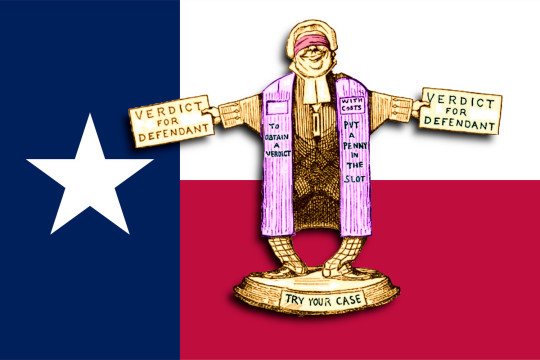
Today (Oct 16) I'm in Minneapolis, keynoting the 26th ACM Conference On Computer-Supported Cooperative Work and Social Computing. Thursday (Oct 19), I'm in Charleston, WV to give the 41st annual McCreight Lecture in the Humanities. Friday (Oct 20), I'm at Charleston's Taylor Books from 12h-14h.

"I’ll believe corporations are people when Texas executes one." The now-famous quip from Robert Reich cuts to the bone of corporate personhood. Corporations are people with speech rights. They are heat-shields that absorb liability on behalf of their owners and managers.
But the membrane separating corporations from people is selectively permeable. A corporation is separate from its owners, who are not liable for its deeds – but it can also be "closely held," and so inseparable from those owners that their religious beliefs can excuse their companies from obeying laws they don't like:
https://clsbluesky.law.columbia.edu/2014/10/13/hobby-lobby-and-closely-held-corporations/
Corporations – not their owners – are liable for their misdeeds (that's the "limited liability" in "limited liablity corporation"). But owners of a murderous company can hold their victims' families hostage and secure bankruptcies for their companies that wipe out their owners' culpability – without any requirement for the owners to surrender their billions to the people they killed and maimed:
https://pluralistic.net/2023/08/11/justice-delayed/#justice-redeemed
Corporations are, in other words, a kind of Schroedinger's Cat for impunity: when it helps the ruling class, corporations are inseparable from their owners; when that would hinder the rich and powerful, corporations are wholly distinct entities. They exist in a state of convenient superposition that collapses only when a plutocrat opens the box and decides what is inside it. Heads they win, tails we lose.
Key to corporate impunity is the rigged bankruptcy system. "Debts that can't be paid, won't be paid," so every successful civilization has some system for discharging debt, or it risks collapse:
https://pluralistic.net/2022/10/09/bankruptcy-protects-fake-people-brutalizes-real-ones/
When you or I declare bankruptcy, we have to give up virtually everything and endure years (or a lifetime) of punitive retaliation based on our stained credit records, and even then, our student debts continue to haunt us, as do lawless scumbag debt-collectors:
https://pluralistic.net/2023/08/12/do-not-pay/#fair-debt-collection-practices-act
When a giant corporation declares bankruptcy, by contrast, it emerges shorn of its union pension obligations and liabilities owed to workers and customers it abused or killed, and continues merrily on its way, re-offending at will. Big companies have mastered the Texas Two-Step, whereby a company creates a subsidiary that inherits all its liabilities, but not its assets. The liability-burdened company is declared bankrupt, and the company's sins are shriven at the bang of a judge's gavel:
https://pluralistic.net/2023/02/01/j-and-j-jk/#risible-gambit
Three US judges oversee the majority of large corporate bankruptcies, and they are so reliable in their deference to this scheme that an entire industry of high-priced lawyers exists solely to game the system to ensure that their clients end up before one of these judges. When the Sacklers were seeking to abscond with their billions in opioid blood-money and stiff their victims' families, they set their sights on Judge Robert Drain in the Southern District of New York:
https://pluralistic.net/2021/05/23/a-bankrupt-process/#sacklers
To get in front of Drain, the Sacklers opened an office in White Plains, NY, then waited 192 days to file bankruptcy papers there (it takes six months to establish jurisdiction). Their papers including invisible metadata that identified the case as destined for Judge Drain's court, in a bid to trick the court's Case Management/Electronic Case Files system to assign the case to him.
The case was even pre-captioned "RDD" ("Robert D Drain"), to nudge clerks into getting their case into a friendly forum.
If the Sacklers hadn't opted for Judge Drain, they might have set their sights on the Houston courthouse presided over by Judge David Jones, the second of of the three most corporate-friendly large bankruptcy judges. Judge Jones is a Texas judge – as in "Texas Two-Step" – and he has a long history of allowing corporate murderers and thieves to escape with their fortunes intact and their victims penniless:
https://pluralistic.net/2021/08/07/hr-4193/#shoppers-choice
But David Jones's reign of error is now in limbo. It turns out that he was secretly romantically involved with Elizabeth Freeman, a leading Texas corporate bankruptcy lawyer who argues Texas Two-Step cases in front of her boyfriend, Judge David Jones.
Judge Jones doesn't deny that he and Freeman are romantically involved, but said that he didn't think this fact warranted disclosure – let alone recusal – because they aren't married and "he didn't benefit economically from her legal work." He said that he'd only have to disclose if the two owned communal property, but the deed for their house lists them as co-owners:
https://www.documentcloud.org/documents/24032507-general-warranty-deed
(Jones claims they don't live together – rather, he owns the house and pays the utility bills but lets Freeman live there.)
Even if they didn't own communal property, judges should not hear cases where one of the parties is represented by their long term romantic partner. I mean, that is a weird sentence to have to type, but I stand by it.
The case that led to the revelation and Jones's stepping away from his cases while the Fifth Circuit investigates is a ghastly – but typical – corporate murder trial. Corizon is a prison healthcare provider that killed prisoners with neglect, in the most cruel and awful ways imaginable. Their families sued, so Corizon budded off two new companies: YesCare got all the contracts and other assets, while Tehum Care Services got all the liabilities:
https://ca.finance.yahoo.com/news/prominent-bankruptcy-judge-david-jones-033801325.html
Then, Tehum paid Freeman to tell her boyfriend, Judge Jones, to let it declare bankruptcy, leaving $173m for YesCare and allocating $37m for the victims suing Tehum. Corizon owes more than $1.2b, "including tens of millions of dollars in unpaid invoices and hundreds of malpractice suits filed by prisoners and their families who have alleged negligent care":
https://www.kccllc.net/tehum/document/2390086230522000000000041
Under the deal, if Corizon murdered your family member, you would get $5,000 in compensation. Corizon gets to continue operating, using that $173m to prolong its yearslong murder spree.
The revelation that Jones and Freeman are lovers has derailed this deal. Jones is under investigation and has recused himself from his cases. The US Trustee – who represents creditors in bankruptcy cases – has intervened to block the deal, calling Tehum "a barren estate, one that was stripped of all of its valuable assets as a result of the combination and divisional mergers that occurred prior to the bankruptcy filing."
This is the third high-profile sleazy corporate bankruptcy that had victory snatched from the jaws of defeat this year: there was Johnson and Johnson's attempt to escape from liability from tricking women into powder their vulvas with asbestos (no, really), the Sacklers' attempt to abscond with billions after kicking off the opioid epidemic that's killed 800,000+ Americans and counting, and now this one.
This one might be the most consequential, though – it has the potential to eliminate one third of the major crime-enabling bankruptcy judges serving today.
One down.
Two to go.

If you'd like an essay-formatted version of this post to read or share, here's a link to it on pluralistic.net, my surveillance-free, ad-free, tracker-free blog:
https://pluralistic.net/2023/10/16/texas-two-step/#david-jones

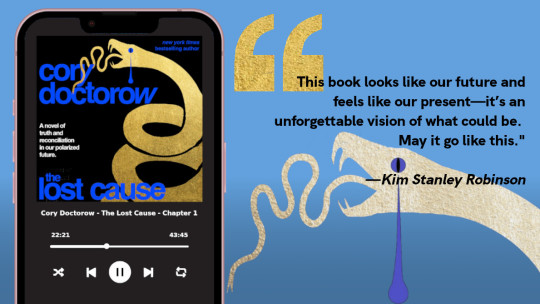
My next novel is The Lost Cause, a hopeful novel of the climate emergency. Amazon won't sell the audiobook, so I made my own and I'm pre-selling it on Kickstarter!
#pluralistic#texas two-step#bankruptcy#houston#texas#mess with texas#corruption#judge david jones#fifth circuit#southern district of texas#elizabeth freeman#yescare#corizon#prisons#private prisons#prison profiteers#Michael Van Deelen#Office of the US Trustee#sacklers#bankruptcy shopping#johnson and johnson#impunity
259 notes
·
View notes
Text
In 2014, the Guardian asked me to nominate my hero of the year. To some people’s surprise, I chose Russell Brand. I loved the way he energised young people who had been alienated from politics. I claimed, perhaps hyperbolically, he was “the best thing that has happened to the left in years” (in my defence, there wasn’t, at the time, much competition).
Today, I can scarcely believe it’s the same man. I’ve watched 50 of his recent videos, with growing incredulity. He appears to have switched from challenging injustice to conjuring phantoms. If, as I suspect it might, politics takes a very dark turn in the next few years, it will be partly as a result of people like Brand.
It’s hard to decide which is most dispiriting: the stupidity of some of the theories he recites, or the lack of originality. He repeatedly says he’s not a conspiracy theorist, but, to me, he certainly sounds like one.
In 2014, he was bursting with new ideas and creative ways of presenting them. Today, he wastes his talent on tired and discredited tales: endless iterations of the alleged evils of the World Economic Forum founder, Klaus Schwab, the Great Reset, Bill Gates, Nancy Pelosi, the former US chief medical adviser, Anthony Fauci, Covid vaccines, medical data, the World Health Organization, Pfizer, smart cities and “the globalist masterplan”.
His videos appear to promote “natural immunity” ahead of vaccines, and for a while pushed ivermectin and hydroxychloroquine as treatments for Covid (they aren’t).
He championed the “Freedom Convoy” that occupied Ottawa, which apparently stood proudly against the “tyranny” of Justin Trudeau’s policies. He hawks Graham Hancock’s widely debunked claims about ancient monuments.
A wildly popular clip from one of his videos about the Dutch nitrate crisis offers a classic conspiracy theory mashup: a tangle of claims that may be true in other contexts, random accusations, scapegoating and resonances with some old and very ugly tropes. He claims that “this whole fertiliser situation is a scam”. The real objective is “to bankrupt the farmers so their land can be grabbed”. This “shows you how the Great Reset operates”, using “globalist” regulations to throw farmers off their land. He claims it’s “connected to the land grab of Bill Gates” and the “corruption of companies like Monsanto”.
In reality, the Dutch government was forced to act by a legal ruling, as levels of nitrate pollution, largely from livestock farms, break European law. Its attempts to curb this pollution have nothing to do with the World Economic Forum and its vacuous rhetoric about a “Great Reset”. Or with Bill Gates. Or with Monsanto, which hasn’t existed since 2018 when it was bought by Bayer. So why mention them? Perhaps because these terms have become potent click triggers.
Brand is repeating claims first made by far-right conspiracists, who have piled into this issue, claiming that the nitrate crisis is a pretext to seize land from farmers, in whom, they claim, true Dutch identity is vested, and hand it to asylum seekers and other immigrants. It’s a version of the “great replacement” conspiracy theory, itself a reworking of the Nazis’ blood and soil tropes about protecting the “rooted” and “authentic” people – in whom “racial purity” and “true” German identity was vested – from “cosmopolitan” and “alien” forces (ie Jews). Brand may not realise this, as the language has changed a little – “cosmopolitans” have become “globalists”, “aliens” have become “immigrants” – but the themes have not.
On and drearily on he goes. He manages to confuse the World Health Organization’s call for better pandemic surveillance (by which it means the tracking of infectious diseases) with coercive surveillance of the population, creating “centralised systems of control where you are ultimately a serf”.
Some of his many rants about Bill Gates are illustrated with an image of the man wearing a multicoloured lapel badge, helpfully circled in red. This speaks to another widespread conspiracy theory: those who wear this badge are members of a secret organisation conspiring to control the world (so secret they stick it on their jackets). In reality, it shows support for the UN sustainable development goals.
Such claims are not just wrong. They are wearyingly, boringly wrong. But, to judge by the figures (he has more than 6 million subscribers on YouTube), the audience loves them.
Some of his theories, such as his recent obsession with UFOs, are innocuous enough. Others have potential to do great harm. There’s the risk to the people scapegoated, such as Fauci, Schwab and Pelosi: subjects of conspiracy theories often become targets of violence. There are the risks misleading claims present to public health. And bizarre stories about shadowy “elites” protect real elites from scrutiny and challenge.
While I’m not suggesting this is his purpose, it’s a tactic used deliberately by powerful people to disarm those who might otherwise hold them to account. Donald Trump’s former chief strategist, Steve Bannon, had a term for it: “flood the zone with shit”. As Naomi Klein has shown, the Great Reset conspiracy theory was conceived by a staffer at the Heartland Institute, a US lobby group that has promoted climate denial and other billionaire-friendly positions. It’s a bastardisation of her shock doctrine hypothesis, distracting people from the malfeasance of those with real power.
560 notes
·
View notes
Text
Rocket's Backstory
*deep breath* God help me
This is the most inconsistent Marvel backstory and I, the top expert on Halfworld, am here to clear it up.
I'm going to split the variants into the following catagories: 1985, 2014, modern comics, show, and mcu. (the show is simply called Guardians of the Galaxy and is on disney+ and i highly recommend).
I have compiled a spreadsheet to go over the main points

As you can see, it's a shit show.
(As i go over the stories as best I can, please note that i am not a comic buff i am a 15 yo with Asperger's and an obsession with Halfworld and if i get something wrong plz don't be mad at me just tell me and I'll fix it :3)
1985 Rocket Raccoon- Rocket is a genetically modified caretaker on Halfworld, a mental asylum used to hold the insane of the galaxy, known as loonies/shrinks (extremely offence things to call mentally ill ppl but it was the 80'ssss). They have a book called the Halfworld Bible, which holds the secrets of the planets and it's people. The planet is ruled by Mayhem Mechaniks and Dyvynicies Inc; rival toy companies owened by Judson Jakes and Lord Dyvyne respectively. Jakes killed Lylla's parents to steal the company and it's... horrifying robot clowns. Pyko steals the Halfworld Bible for it's instructions on how to escape the planet in a giant human-shaped ship. Jakes and Dyvyne find out about this plot and team up to crash a party and there's a big battle and Rocket, Lylla, Pyko, Wal, Blackjack, and possibly Pyko escape Halfworld on the ship, leaving it in shambles as the loonies are left to the own devices to rebuilt the planet with their newfound wisdom (Pyko manages to 'cure' them)

2014 Rocket Raccoon (my fav series :3)- This one doesn't have much in the way of backstory, all we know is what Captain Sale gives us in the last book. Throughout the series it is shown that Rocket has no memory of his creation and believes he is the last of his kind. Until he ends up on Captain Sale's ship. She gives he the key to the Book of Halfworld and he takes 4 hours to read it. He is shown to be disgusted and horrified at the contents, leaving it with Sale and going home. (Clowns and the toy factory etc are mentioned, implying it is a sequel to the 1985 version.

Modern Comics- This section is specifically about v5 GotG #8 as I don't recall any other comics going into much detail. Here, there are loonies and robots, but no clowns. They must have thought it was too silly. Rocket is a therapy animal turned sentient with cruel experimentation. This is the first version of Rocket's backstory to show him sustaining significant and lasting trauma from his past. Not to mention the debilitating physical effects of having a metal skeleton and countless other weird things he doesn't understand. After his transformation, he is shown with the 1985 gang and other past team ups in a montage. It seems there is also an attempt at continuity here but it misses the mark a bit.

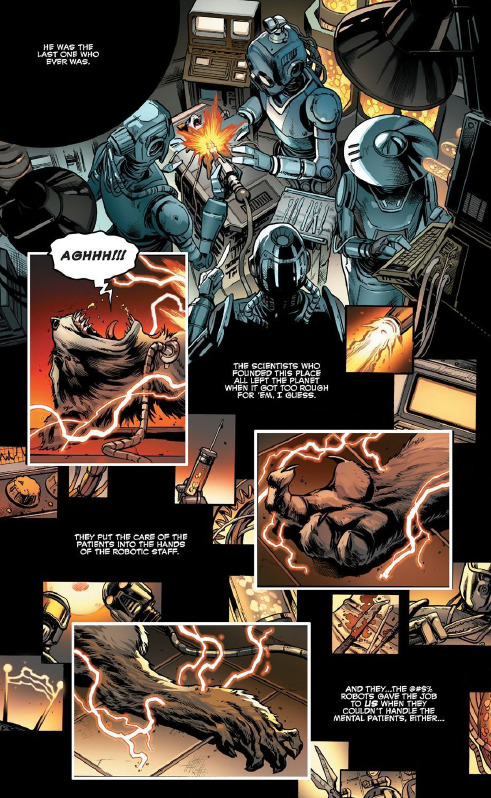
GotG Show 2015- This is by far the worst adaptation in my opinion, as it completely overhauls the story. So note that I have bias here. Here, Rocket is a simple Earth raccoon that has been transformed with the purpose of being a living weapon. His purpose was more 'artificial genius' than 'genetic marvel'. Immediately after being let into a more open enclosure, he meets Groot and effortlessly destroys the robots and steals a ravanger ship. After freeing all the creatures, of course.
(i am unable to provide images for this section as disney is a pussy ass company and won't let me screenshot but just imagine it sucking)
MCU- Anyone reading this has already seen the movies but I'll go over it anyway. The High Evolutionary is a man trying to recreate a sentient Earth-like planet by modifying creatures. Rocket is one of these poor souls. He lives his early years in a cage with Floor, Lylla, and Teefs. Rocket manages to open the cage one day, only to have his friends shot in front of him by the High Evolutionary. He then escapes. He meets Groot later in a well, not shown but confirmed by James Gunn.
Wow this took long to write. Time for the conclusion. Here i will 'average out' all the stories and throw in my personal theories.
My version- Halfworld is an insane asylum built by the Kree where they experiment on mentally ill people to try to cure them(we used to do this here on earth until the 60's). The 'toy factory' is a cover-up for this operation. The robot 'doctors' use clown faces to put the patients at ease. But what do psycho robot doctors do when the asylum is abandoned and not longer supplied with patients? They turn to the animal inhabitants on the planet. The Halfworld Bible/ Book of Halfworld is an engineering manual documenting the disgusting progress of making an innocent creature sentient. Pyko frees his people after decades of slavery in a grand rebellion and Lylla becomes the Priestess and guardian of the book like in 1985. Unfortunately, during the rebellion, 89P13 and Groot get stuck in an escape pod and sent away from the Keystone Quadrent, leading him to believe all of his people are dead or re-enslaved.
I think this version harnesses the soul and vibe of all the backstories while making it make more sense in the long run.
I had a lot of fun putting this together and I hope y'all appreciate it :D (Follow for more Halfworld content <3)
#artists on tumblr#anime and manga#autism#gotg#guardians of the galaxy#rocket raccoon#lylla otter#pyko tortoise#halfworld#uno duo trey#marvel#mcu#comics
31 notes
·
View notes
Text
Few countries’ economies are so bound to one resource. Global Witness, an international watchdog that monitors natural-resource exploitation, estimates that Myanmar’s jade trade was worth up to $31 billion in 2014, nearly half the nation’s GDP that year. Yet the industry remains shrouded. The ethnic Kachin, though native to the jade hills, control few of the mines. In the 1990s, the Kachin Independence Army (KIA), one of several ethnic armed groups fighting the state in Myanmar’s borderlands, lost control of territory around Hpakant.
Today most of the big concessions belong to companies or cronies connected to the Burmese military elite. Even as the country has transitioned from five decades of military rule to semicivilian authority, jade has proved the limits of democratic governance. Most stones are smuggled over the border to neighboring China; only a fraction are subject to the tax needed to fill government coffers in one of Asia’s poorest countries. The scale of graft and unaccountability is such that Global Witness calls Myanmar’s jade economy the “biggest natural-resource heist in modern history.”
[...]
The world’s best jade mines are sealed off to nearly all foreigners. But I managed to access Hpakant to experience a place so beguiling to 18th century Chinese imperial envoys that hundreds perished en route in the malarial wilderness. The scenes before me look like a cross between a magnified ant farm and a Star Wars set. In the distance I spy what appear to be hundreds of tiny insects clinging to a hillside. As we drive closer, I realize they are men. Backhoes, excavators and giant trucks maneuver through a lunar landscape like creatures from an alien planet. Hpakant was once the domain of tigers and verdant foliage. All I see is dust and brown. Where prospectors used to dig by hand, now explosives and heavy machinery, mostly imported U.S. or Chinese brands, are ripping the entrails out of jungle, demolishing entire mountains within months. Already, Hpakant is mostly dead.
Fatal accidents mount. Only the biggest, like a November 2015 landslide that killed about 200 miners, make headlines. Township officials have recorded hundreds of deaths in jade-mining accidents over the past year and a half. But locals say the real number is many times that. And in the hills, the Burmese army and Kachin rebels continue to wage war. “If there was no jade, there would be no war in Kachin state,” says Yup Zaw Hkawng, an ethnic Kachin who owned large mining concessions before the Burmese military wrested control of Hpakant. “We are living and sleeping on so much jade in our earth, but jade is Kachin’s curse.”
[...]
Sequestered from the outside world, Hpakant radiates a gold-rush lawlessness. Unexplained killings occur with regularity. While we are there, a schoolteacher is shot in the head. The day before, a jade trader died from an executioner’s bullet. Last year bombs exploded at the headquarters of two mining companies. In November, a jade scavenger at Hmaw Sisar mine was shot dead by military intelligence or the KIA, depending on who’s telling the story. “There is no real law in Hpakant,” says one of the immigration officers holding us, with a touch of apology. “We don’t know who to trust.”
22 notes
·
View notes
Text
To be fair, I think there's a lot of nuance between "the OGL was always bad and everyone was a sucker to have trusted WotC to uphold it" and "the OGL is the best thing to happen to D&D and D&D will die without it."
First of all, a bit of context: the OGL wasn't published purely out of the kindness of Wizards of the Coast's hearts. It was a decision informed by the desire to make D&D into the absolute biggest game on the market. The prevailing logic of the time was that while any growth to the RPG hobby in general would feed back to the industry leader, the fact that the market was fractured and there were so many competing systems meant that there would be resistance towards people shifting to D&D from other games. The idea was that the lower the barrier to creating D&D compatible content the less support there would be in the market for other systems and the more people would gravitate towards D&D.
Or at least that's what Ryan Dancey, one of the architects of the OGL, claimed at the time. This is all from an interview with him, via the Internet Archive.
But the important thing to remember that the context in which the OGL was made was also one where the RPG industry had seen multiple instances of litigation because games and products had been seen as infringing on established copyrights. While it's easy for us to say that the OGL was a useless document only motivated by corporate greed, it ignores the historical context in which the OGL was first introduced: an environment where just seven years before Palladium Books had taken legal action against Wizards of the Coast due to copyright infringement. Even though with the benefit of hindsight it's easy to say that rules and mechanics aren't copyrightable and law specifically allows you to claim compatibility, the actual lived experience in the RPG community at the time was that ligitous companies could and would sue you for something as simple as claiming compatibility. Hell, TSR was supposedly so litigious in the 80s and 90s that people came up with the backronym "They Sue Regularly" for them.
So in that context the OGL, even if it technically didn't grant any rights people didn't already have based on existing law (and even on this there doesn't seem to be a consensus), was a massive game changer: it was permission from a company to use their house system to produce compatible content without having to fear limitation!
The OGL was always made with the intent of making D&D the biggest game on the market and to diminish the market share of competitors on the market. But it also marked a huge change in the industry towards how large publishers approached third party content.
But between the d20 bubble bursting in the early 2000s and the introduction of 4e and the GSL and the ensuing loss of a lot of customer goodwill and most third party support, the OGL had also become something of a problem for WotC. It had managed to create their biggest competitor and allowed an independent market to emerge where people used it to create material that did not feed back into the official D&D ecosystem (see the whole of the OSR and any number of d20-based games that are so distinct from D&D that any claims of compatibility are strenuous at best). In light of this I think it's understandable why it took some time for Wizards to adopt the OGL for D&D 5e (5e came out in 2014; it wasn't until 2016 until parts of 5e were made available through the OGL) but also why their new management seem to want to unauthorize the original OGL: the OGL was created in a completely different context and the current prevailing wisdom at WotC is that D&D should be a walled garden that WotC controls, because the OGL in its original form has caused WotC problems down the line (while I do think it could be said to have achieved its original goal of making D&D the market leader and creating a lot of resistance towards the use of other game systems). The prevailing opinion is no longer that vibrant third party support creates demand for the core product (and I mean, that was always something of a flaw in the original plan: once you've sold everyone a Player's Handbook, they no longer need to keep buying it no matter how many more third party products come out). Instead, those third party sales are now seen as taking away money that could be better spent on official D&D stuff.
None of this is to say that I think what WotC is doing is good: even if the OGL had been meaningless from a legal standpoint it had sent a message that creators had some degree of protection from legal action. Even if its original purpose was to suffocate the market with D&D support to the detriment of other games, it was still an entry point for many amazing creatives in the industry and it has played a small part in making the RPG scene more vibrant. I won't discuss whether or not WotC can legally unauthorize the original OGL, but from my own point of view whatever the legality of it is, just the idea of unauthorizing it is a betrayal to many creatives who in good faith expected to be able to continue using it.
Anyway, Kobold is supposedly working on a secret project, which to me sounds like they're going to make their own game that just so happens to be compatible with D&D while not using the OGL but only time will tell, and Paizo is in the process of creating their own open license, probably so they can keep Pathfinder 2e open to third party creators. We'll see how this pans out.
146 notes
·
View notes
Text

ZENITH ENTERTAINMENT is a fictional South Korean entertainment company. It was founded in 2016 by former SM Entertainment executive LEE TAEIN, shortly after his supposedly amicable departure from the company.
They are best known for their first and flagship group FABLE, who continues to be the only artist formed solely by the company. Zenith is also notable for the way CEO Taein notoriously inserts himself into the smallest of business decisions, and their refusal to take trainees since Fable’s debut.

BASICS
NAME: Zenith Entertainment
TYPE: Private
INDUSTRY: Music, entertainment
FOUNDED: 2016
FOUNDER: Lee Taein
HEADQUARTERS: Jongno-gu, Seoul, South Korea
AREA SERVED: Worldwide
NUMBER OF EMPLOYEES: 20+

ARTISTS
FABLE (2018 — present): eight seven member boy group
NEON NIGHTS (2021 — present): five member girl band
JAESUN (2023 — present): idol soloist

NOTABLE PEOPLE

LEE TAEIN (1969) … Founder, CEO, and Fable's creative director. Former SM Entertainment talent acquisition director. Played by Lee Byung-hun.
PARK SANGHYUN (1972) … COO and CFO. Has been trying to get a private office for the past seven years. Played by Lee Seo-jin.
CHEN YUXUAN (2002) … Taein and Sanghyun's executive assistant. Underpaid and overworked intern. Played by Liu Yu.
WOO HYEKYUNG (1997) … Social media & marketing manager. Has held the position since 2017. Rules the open office with an iron fist. Played by Park Soobin.
SHIN JUBIN (1985) … Neon Nights and Jaesun's creative director. Classics fan. Can conjugate ancient Greek. Played by Hwang Jung-eum.

KIM GAEUN (1981) … Fable's lead stylist. Co-founder of modern hanbok brand Shinbok. Played by Son Ye-jin.
HONG SHINUI (1975) … Historical consultant for Fable. Korea University adjunct professor. Historian specializing in the middle period of the Joseon dynasty. Played by Lee Tae-ran.
JEON DAEWOONG (1995) … Fable's manager. Former SM Entertainment trainee, 2014-2017. Always thinking about who he could have been. Played by Ahn Hyo-seop.
LEE AERIN (1990) … Neon Nights' manager. Not their first fan, but still their biggest one. Played by Tiffany Young.
NAM CHOHYUN (1998) … Jaesun's manager. Also his cousin. Otherwise unqualified for his job. Played by Han Gichan.

MAJOR SHAREHOLDERS

LEE TAEIN (1969) … 60%. Founder and CEO.
AHN █████ (197█) … 15%. ███████ Group ███. Played by ████ ███.
JUNG SEOBUM (1990) … 10%. Venture capitalist, representing Daehan Ventures. Played by Lee Junho.
████ █████████ (19██) … 7%. Lawyer, the eponymous ████ of law firm ████ & ███. Played by ███ ████████.
███ █████████ (1969) … 6%. Senior Superintendent in the █████ ████████████ ██████ ██████. Played by ███ ████████.
LEE JAESEOP (1995) … 2%. Idol, member of Fable. Played by Kim Doyoung.
#╰ to be written in ink is to be immortal — [ misc. ]#fictional idol community#fictional idol oc#idol oc#kpop oc#kpop addition#idolverse#typos or errors probably but i will fix them later after work
24 notes
·
View notes
Text
British journalist Catherine Belton spent more than 15 years working as a reporter in Russia for the Financial Times, The Moscow Times, and Businessweek, and she now covers Russian politics and the war in Ukraine for The Washington Post. In 2020, Belton published her first book, “Putin’s People: How the KGB Took Back Russia and Then Took On the West,” which immediately became a bestseller. Following the death of Alexey Navalny, she published a Russian-language edition of the book that’s available for free. For Meduza, American journalist Tanya Lukyanova spoke with Belton about how she managed to untangle the logic behind the system that has allowed Putin to rule Russia for more than 20 years.
As Catherine Belton was finishing school, the Berlin Wall was coming down. Entranced by the Soviet empire’s collapse, she went on to study Russian and German at university, “and the fascination just continued to expand from there,” she said in an interview with Meduza.
Belton would go on to work as a journalist based in Russia from 1998 until 2014, covering the country “pretty much nonstop” during Vladimir Putin’s first two presidential terms. From 2007 to 2012, the period when Putin temporarily relinquished the presidency to Dmitry Medvedev and served as prime minister, Belton worked for the Financial Times as a Moscow correspondent covering the world of business.
“It was a different era then,” she explained. “Russian billionaires [and] government officials all wanted to be on the pages of Businessweek and the Financial Times — presenting their country, presenting their companies, and trying to be integrated into the global economy.”
Belton’s wealth of experience reporting on Russia eventually led her to write a book, Putin’s People, which was published to international acclaim in 2020. As she told Meduza, the book began as an investigation into the system Putin had built by taking over the country’s strategic cash flows and placing them in the hands of loyal allies. “We didn’t really understand what made Putin tick and why he ran the economy the way he did,” Belton explained. “But as I was reporting that, it really became very obvious that he was replicating a system that was rooted in the KGB.”
As Belton’s reporting revealed, the wealth Putin and his cronies had amassed was just one small piece of the puzzle:
“A lot of the stealing that was going on wasn’t about Putin lining his own pockets: It was [about] gathering strategic slush funds and replicating a system of KGB frontmen and intermediaries, who would then be able to funnel wealth into the West. And then eventually, as they had in the 1970s and 80s, they’d use that wealth to divide and disrupt and undermine their rivals in the West.”
Belton is still in regular contact with the sources she interviewed for her book. Some of these members of the Russian elite, she said, were “horrified” when Putin launched the 2022 invasion of Ukraine, which they perceived as a “catastrophe for the 30 years of empire building and all the ties that they [had] built into the West.” But with the full-scale war now in its third year, she now fears that some Russian elites and billionaires smell blood in the water:
“I’m now afraid [that] they see Western weakness, the paralysis in the U.S., and perhaps think that the war now presents an opportunity to redraw the post-Cold War map and have this new alliance of Russia, India, and China, which they believe is going to replace a weaker West. So unfortunately, most of the Russian billionaires and elites are still sharks.”
Putin, meanwhile, appears increasingly entrenched in his political views. “You can see that Putin has really held on to certain beliefs,” Belton pointed out. “He was part of this progressive faction of the KGB that blamed communism for failing the project of the Russian Empire. He blamed the Bolsheviks for tearing the country up into republics that didn’t exist before (i.e. Ukraine). So even then he was an imperialist.”
The Russian president has also continued to keep his friends close, surrounding himself with sycophants who often share his intelligence officer roots. Though their influence may wax and wane, these officials have traditionally made up a “collective Putin,” Belton explained:
“There are other people in the administration who had security service backgrounds who were either prompting or advising him to act in a certain way — [Security Council Secretary] Nikolai Patrushev, for instance, who had always been more senior than him [...] At various stages of Putin’s career, he seems to have been clearly manipulating Putin and trying to make sure that he stayed in power.”
“I think Patrushev is still very much a leading ideologue,” she added.
According to Belton, Putin’s bitter resentment towards the West is based on a mixture of grievances, some of which she considers valid and others she views as “exaggerated and amplified” by his KGB background and personal paranoia. “It’s certainly true that after Putin came to the presidency, he did make overtures towards partnership with the West,” she pointed out. “And I was told by people close to him then that Putin is a ‘transactional guy.’ He was expecting favors in return — in the typical, mafia-style leadership — but he didn’t get any. He just got, in his view, a kick in the head.”
The West, in turn, was too dismissive of Putin and therefore failed to see Russia — and Russian corruption in particular — as a security threat. “Everyone thought that after the collapse of the Soviet Union, all that remained for Russia to do was to integrate into the Western rules-based order,” Belton recalled. “We thought that the more Russian cash came into the West the better, because Russia was going to have to adapt to our governance standards and so on.”
With this assumption in mind, Western countries readily accepted the money Putin’s system siphoned out, believing that corruption made Russia weak, when really it was a means of consolidating power. Once seen as independent, Russian billionaires became “beholden to the Kremlin for maintaining their wealth,” Belton explained. And having failed to grasp that an economy under Putin didn’t function like one of their own, Western countries “just decided to lie back and take the money.”
“Putin realized very early on that this was a big weakness in the way the West works, that we’d just take profits and not think about the consequences,” Belton said.
Russia’s oligarchs did not take kindly to Belton’s book. Just before the one-year statute of limitations under U.K. libel law, billionaire Roman Abramovich sued the journalist and her publisher for defamation. Billionaires Mikhail Fridman, Peter Aven, and Shalva Chigirinsky followed suit, as did Russian state oil giant Rosneft.
“I was very fortunate because my publisher, HarperCollins, stood very strongly behind me, and they covered all the legal costs,” Belton told Meduza. “I think had it just been me, I would have been forced to withdraw the book after seven years of work. I wouldn’t have been able to withstand such a barrage.”
Abramovich settled his claim against Belton in December 2021, after the journalist and her publisher agreed to make revisions to the text. “We changed some small things, which I’m still a bit upset about, but we basically didn't change the sense of the narrative,” she said. The other defendants subsequently settled or dropped their claims.
“In some ways, there’s a silver lining,” Belton added. “Because the pile on was so enormous, it attracted a lot of media attention. And people could really see how Russian billionaires and the Kremlin had been using the legal system and legal threats to silence and intimidate journalists from covering some of their activities.”
Earlier this month, Belton announced that she had made the Russian-language edition of Putin’s People available for free. “Although the general trajectory of Putin’s presidency is well known, I wanted Russians to be able to read the details from Kremlin insiders who have not spoken before,” she explained. “[I] would like it to be more widely known and shared within Russia that we know what Putin presents now is not Russia’s true face, but one that has been distorted and manipulated by his cabal.”
Belton was still hammering out the details of the release when Russian opposition leader Alexey Navalny suddenly died in prison. The sea of mourners who turned up for Navalny’s funeral pushed her to publish the free edition of Putin’s People right away. “The fact that tens of thousands were coming out and openly defying the police presence, chanting ‘No to war,’ and, in many ways, showing that Navalny’s legacy was living on no matter what — that this other Russia we all loved still exists despite the heavy Kremlin propaganda and the fear tactics — really inspired me,” she said.
12 notes
·
View notes
Text
"I will also write my reflection about the "shark". Because I've been thinking about it for the second day and still feel the need to write. This will be a long and possibly boring post. And for me, for some reason, this is not about humanism, with which, even during the 16 months of genocide and the horrors of war, Ukrainians, in my opinion, are fine. It's about somewhat double standards.
While studying the history of our Ukraine, I used to be often disturbed by the feeling that the world approached Ukrainians with some kind of prejudiced and overestimated bar.
During the Holodomor of 1932-1933, the Russians killed millions of Ukrainians, the world knew, but remained silent, even today they cannot take the Pulitzer Prize from the scoundrel - a servant of Stalin - Durante. And we are still fighting for full recognition of the Holodomor as Genocide and full condemnation of Russia for it.
During the Second World War, the vast majority of the European theater of war was on the territory of Ukraine. For 6 years, armies with two hateful regimes marched back and forth through our homes. Ukraine was not the only country that was occupied by the nazis (and before that by the Soviet Union), but we were the only ones who were always complained that the Ukrainians somehow did not survive the right way under the occupation. Claims that I have not heard in the same number about Western European countries.
During the first years of independence, after the completely unequal exchange of the 3rd largest nuclear arsenal in the world for a piece of paper from Budapest, after the first failed privatization reform with a frankly evil design, which, in the absence of the rule of law, people's funds and minimal financial literacy, became the basis of oligarchization, we more than someone were reprimanded for corruption, and at the same time they dealt with our oligarchs, as they did with Russian oligarchs for a long time - and with some still do. It does not mean that we did not have corruption, but most of our corruption chains were impossible without the participation of other countries.
During Russia's attack on us in 2014, there were too many examples that I personally remember of demands to Ukraine, especially regarding uncontrolled territories captured by the Russians, rather than demands to the aggressor.
During the 2015+ reforms, there were many important reforms recommended by the partners, but there were also decentralization, openness of public finances, international procurement and prozorro, digitalization, which you will not find in any international commitment until they become successful. And there were frankly failed reforms in the style of privatization in 1995, which turned into annual experiments with changes in laws without results. And as a small example - despite a successful track record, in 5 years in the Ministry of Finance and in the nomination committee, I did not manage to defend the simple and such a natural requirement of knowledge/study of the Ukrainian language by candidates for supervisory boards of state-owned companies, so as not to strengthen the inferiority complex.
And of course, I fully understand that we, Ukrainians, are not perfect. That there were crimes on our part, and there were crimes among us, and there was systemic corruption before 2013, and although it is no longer non-systemic, it unfortunately remained after that. That's why I always drove away such thoughts about the bias of the world, explaining to myself that: "Life is not fair, we ourselves must work harder and prove that we can" or "There is no globe of Ukraine. Everyone has their own interests. We need to grow up and fight for the interests of Ukraine in an adult way and not be emotionally offended" and in the end "this is a whole century of Russian propaganda, culture-multure and art, which they generously promoted for money and look at us through the prism of this anti-Ukrainian propaganda"
And somehow these explanations allowed me to turn unpleasant pages and direct all my energy to work. To prove that we, Ukrainians, can do everything and more. We can be the best international student, we can reduce the debt to less than 50% of GDP and the deficit below 2%. And the world will see and appreciate what kind of Europeans and democrats we are. That we are equal among equals.
So when I am now in the 16th month of the bloody massacre, which was arranged by the aggressive, inadequate Russian imperial neighbors in our country, when after Bucha, Mariupol, Kharkiv, Izyum, tortured women and children, our killed prisoners of war in Olenivka and tortured, barely alive soldiers, whom we receive from rashists in exchange, when our prisoners are cut off their heads and castrated on camera - and we all still adhere to the customs of war and all conventions, we save people and animals, when inhumans blow up a dam and drown whole regions in water - once again we hear that "you shouldn't joke like that", or "for some reason Ukrainians don't shake hands with some Russian athletes" or "Ukrainians refuse to speak at the same event with Russian imperial liberals" or "somehow the wrong chevrons were worn by those who use their bodies to close the civilized world from the Russian plague", this feeling of injustice in the approach to Ukraine creeps up on me again. It seems that the victim, who is fighting, is being denied even the right to an emotion towards the executioner. How once the Soviet Russians during the Holodomor denied us the right to mourn the dead and tried to steal even the memory of our grief.
Nevertheless, we have a goal - to survive and win. And we understand that achieving this goal is existentially important for Ukraine as a country and Ukrainians as people. That's why we will once again drive away these thoughts of injustice from us, and once again, we will do what we as Ukrainians know how to do - we will join the work with double strength. And we'll bite our victory out.
Glory to the Armed Forces of Ukraine, to all our defenders, and to our heroic people! ✊🏼🇺🇦"
(c) Oksana Markarova
17 notes
·
View notes
Text
About GRLZ HIGH
GRLZ HIGH was a six member K-pop girl group that debuted under MISSMUSE Entertainment (now known as Storybook Entertainment) on the 21st of July 2014.
──
Warnings: Bullying, abuse, blackmail, scamming, hate messages, and cyberbullying.
──
The members consisted of;
Kim YUNA Dasom - 24* - Lead Vocal, Leader
Lee BinBin Bitna - 22 - Main Rapper, Lead Dancer
Kim Cherri Myung-Hee - 22 - Lead Rapper
Hwang MIA Da-Eun - 21 - Lead Dancer, Sub Vocal
Bae Haneul So-Hee - 20 - Main Dancer
Park Sena Byeol - 20 - Visual, Main Vocal
*Ages above are age at debut.
──
GRLZ HIGH tried multiple different concepts during their career, such as hip hop or cute concepts, but they were best known for their sexy-cute songs. The girls were not a household name by any means, but they were able to gain a modest fanbanse. This was largely due to MME spending the biggest portion of their funds on the group, even to the point where the CEO allegedly sold her private car to increase the budget of the ‘Heart Attack’ music video. However, GRLZ HIGH's successes were few and far between, and it was very difficult for them to secure any tv spots, let alone wins, as they were from an unknown company. Due to their lack of funds, the girls had to share a dingy two bedroom apartment with their manager and, along with the pressure of their struggling idol careers, this put a strain on the groups relationships.
Unbeknownst to the public, there was division within the group. YUNA, Cherri, BinBin and MIA were on one side, and Haneul and Sena were on the other. According to the other four, Haneul and Sena were unfairly favoured, both by fans and the company, for their visuals despite them being ‘the most untalented/laziest members’. Although there was no real proof of this, it sparked jealousy amongst the four causing them to treat the other two very poorly. Haneul and Sena were practically ran out of the group on the 12th of December 2015 when the bullying and mental abuse became too much to handle, resulting in the termination of their contracts. The two girls were blackmailed to keep silent using explicit personal images and evidence of them breaking company rules (leaving hotels, smoking, etc), but also the neglectful staff members, such as their manager who chose to ignore the obvious signs, meant that the higher ups were unaware of any bullying.
The group continued as 4 members after their departure, but there were a lot of rumours and confusion created in response to the sudden news. A controversial kpop news channel named ‘Seo-Yeon Holmes’ even made a YouTube video named ‘How to Catch a Bully’ which featured clips of several different kpop groups- one of which being GRLZ HIGH- and ultimately claimed that the videos were proof of bullying within the selected groups. This video blew up, and although some people defended the girls, claiming that the accusations were baseless and defamatory, GRLZ HIGH began to attract negative attention. The members were infuriated by this, and sent Haneul and Sena hate, both anonymously and directly, for trying to ‘sabotage’ the group.
Even when the accusations came out, MISSMUSE staff were generally very caring and supportive towards the members. YUNA decided to take advantage of this and ask for multiple ‘loans’ from managers and stylists. Obviously she never paid them back, since she was living of off an allowance, and it was eventually brought to the higher ups of the company. YUNA was silently put on hiatus, as an attempt to not stir up any more negative press. It wasn't until an ex-staff member spoke up online that the information was brought to the public. The news of the scamming once again threw GRLZ HIGH into the spotlight, but for all of the wrong reasons. MME originally planned to try continue GRLZ HIGH as three, but an anonymous source soon came out with allegations, and this time, real proof, of bullying and abuse towards ex-members Haneul and Sena. This source would later reveal themselves as Sena, a month after the groups disbandment.
GRLZ HIGH was forced to disband on the 10th of February 2017 due to all of the negative attention they had gained in the media. They had amassed a total of 0 music show wins by the end of their career. YUNA was soon prosecuted for not repaying staff members over USD$700 in loans. However, due to harassment laws not being strongly enforced, and bullying cases being extremely hard to win, Haneul and Sena did not press charges against the four members. After the scandal came out and was ‘resolved’ none of the girls tried to redebut in the industry, and all are now living quiet lives. Despite this, photos of Sena and Haneul hanging out together on their private Instagrams have been leaked, along with photos of Yuna and Mia separately. Cherri and BinBin have not been seen on any social media platforms after the incident.
──
DISCOGRAPHY (Title Tracks):
Why Did You Come To My Home? (July 2014)
Like It! (Nov 2014)
Crush (April 2015)
Heart Attack (October 2015)
LAST LOVE (August 2016)
#kpop oc#fake kpop group#fictional idol community#fictional idol group#novellagg#fake kpop girl group#.𖥔 ݁ ˖.𖥔 ݁ ˖ ʙᴀᴄᴋ ꜰʀᴏᴍ ᴛʜᴇ ᴅᴇᴀᴅ . ── (ᴘʀᴏꜰɪʟᴇ)
3 notes
·
View notes
Text
A federal lawsuit filed Tuesday alleges The Church of Jesus Christ of Latter-day Saints investment arm misused hundreds of thousands of dollars donated by three men by investing the money instead of using it for charitable purposes as they claim was promised.
The legal action brings more scrutiny about how the faith, known widely as the Mormon church, handles its vast financial holdings bolstered by so-called “tithing” from by members who contribute 10% of their income. The church doesn't publicly disclose details about its finances.
This new lawsuit against the business and investment entities under the church in U.S. District Court in Salt Lake City is similar to one filed in federal court in California by James Huntsman, brother of former Utah Gov. Jon Huntsman, Jr., that recently scored a partial success on appeal and remains pending. That lawsuit seeks the return of $5 million he donated before he left the church.
In February, the U.S. Securities and Exchange Commission fined the church and Ensign Peak $5 million for using shell companies to obscure the size of the investment portfolio under church control. The church agreed to pay $1 million and Ensign Peak will pay $4 million.
Church officials didn’t immediately respond for comment on the lawsuit.
The church has previously defended how it handles member contributions, calling Huntsman’s claims baseless while claiming contributions go to a variety of religious purposes including missionary work, education, humanitarian causes and construction of churches, temples and other buildings important to church work.
At issue in both lawsuits is whether the church's investments in stocks, bonds, real estate and agriculture reflect the wishes of its donors.
The church's corporate arm, the Corporation of the President of the Church of Jesus Christ of Latter-day Saints, solicits donations for humanitarian relief with promises that all donations are used to help those in need. But those promises are untrue, the latest lawsuit argues.
Instead, the church allegedly hid the fact that some if not all donations are permanently invested in accounts never used for charitable work. That includes tithes; regular donations amounting to 10% of a person’s income expected from members of the church. The money instead has gone to Ensign Peak Advisors, a nonprofit created in 1997 that has grown to over $100 billion in value, the lawsuit alleges.
The lawsuit is filed by Daniel Chappell, of Virginia, and Masen Christensen and John Oaks, both of Utah. They claim the three of them combined have donated about $350,000 to the church over the past decade. Their lawsuit seeks class-action certification, potentially involving millions of church members, and an independent entity to oversee collection and use of church donations.
Like the lawsuit filed by Huntsman, the lawsuit filed by the three men leans on allegations by whistleblower David Nielsen, a former Ensign Peak investment manager who this year submitted a 90-page memorandum to the U.S. Senate Finance Committee demanding oversight into the church’s finances.
Ensign Peak has spent funds only twice in its 26-year history, according to both lawsuits. In 2009, Ensign Peak spent $600 million to bail out a failing church-owned, for-profit life insurance company. From 2010-2014 it put $1.4 billion to build a mall near Temple Square in downtown Salt Lake City.
A judge ruled in favor of the church in Huntsman's case but in August the U.S. Ninth Circuit Court of Appeals disagreed in part and sent the case back to district court for further proceedings. The church has filed for a rehearing in the appeals court, saying the church president had explained the project would be paid for through investment earnings and not tithing funds.
4 notes
·
View notes
Text
Monza in half: new referees, same mistakes
The italian press is back! Most of it is against the shit show FIA did and how that ruined Monza because like one of our comm said, “they ruined the race but then they use the shot from Monza podium to promote the sport”. And isn’t he 100% right.
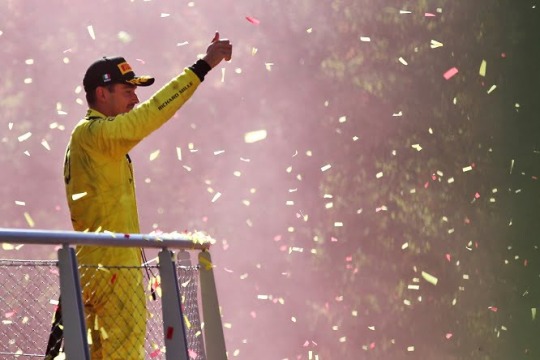
As always, translation under the cut, every mistake is on me, pls share to support my effort in sharing italian press with you all✨
Unanimous booing, by those who were dressed in red and those in orange. The final of the Italian Grand Prix under the Safety Car regime has displeased everyone, winners and losers, and that is what the FIA should think about. Does the F1 of the show and sold out at every Grand Prix have to take a step towards the public even at the cost of not fully complying with the verdict that has emerged on the track in terms of performance? It is a question that Stefano Domenicali (CEO of Liberty Media) and Mohammed Bin Sulayem (president of the FIA) will surely ask themselves. ‘Change the referee, not the mistakes,’ is the title of Leo Turrini’s editorial on Il Resto del Carlino “The logic of the sport would have imposed to grant Leclerc the extreme chance. I don't think there are conspiracies. Instead, there is a worrying incompetence, already seen in the past. This Formula 1, so loved by an increasingly young audience, has a moral obligation to respect those who follow it.”
‘Hashes and steps back, inadequate Federation’ is instead the title of Giorgio Terruzzi's comment on Il Corriere della Sera. “They are slow, always a little arrogant. They are the men of the International Federation. A company to change after a few too many messes, like the one that handed over the title to Verstappen, Abu Dhabi 2021. Some are fired, others are appointed, rarely based on authority. In Monza on Saturday it took them almost 4 hours to dial the starting grid, losing the path dealing with the drivers penalties. Not satisfied, they put on a (slow as hell, can’t be a literal translation) finish yesterday, complete with tractors on the track under safety car – entered at the wrong time – offering the same scene that in 2014 in Japan cost Bianchi his life”, the attack that starts from the columns of the Milan-based newspaper.
‘Monza in half’ is instead the opening of Repubblica: “One hundred years of solitude. Without a race-worthy ending, without battle and without joy. Not even for those who win, Max Verstappen, even if that success would have been deserved anyway. And instead he is unfairly booed. Monza celebrates a century disatisfiing everyone – the bitter observation underlined by the newspaper based in Rome – on the grandstands there are 150 thousand fans who paid to see a show, not a train of immobilized cars passing under the finish line. The booing is mainly for the race management, which does apply a regulation, but in a clumsy and slow way. Perhaps overwhelmed by the still alive ghosts of the deconclusional epilogue of the last championship in Abu Dhabi, after which, apart from the threats to Michael Masi and his exit from the Fia, the rules were changed precisely for situations similar to those of yesterday.”
‘Fifth Power’ headlines La Stampa, focusing on Max Verstappen’s fifth consecutive victory: “Max Verstappen’s Italian mission ends with the fifth consecutive victory, the eleventh of the season, the 31st of his career. One of the ugliest, though deserved: the race was neutralized by the safety car with eight laps to go and ended like this, with the cars being columned and the ban on overtaking. At the checkered flag, the fans pour themselves as traditionally along the entire straight line and whistle the Red Bull champion because he doesn't drive a Ferrari. Nothing else they can reproach him: he is the best. He had never climbed the podium in Monza, he had never experienced the emotion of seeing that red multitude that now disputes him. He will come up for the championship perhaps already in the next Grand Prix in Singapore, where a series of results could guarantee him the second consecutive title.” Booing or not, Safety Car or not, with 11 wins out of 16 races played in this 2022 Max Verstappen already has the first match point on the championship in the sixth final race of the season.
#f1#italian gp 2022#italian press#maFIA#I would have posted sooner if it wasn’t for FEDEZ ATTEMPTING MY LIFE
30 notes
·
View notes
Text
Taylor Swift has reached an agreement with two songwriters to end a five-year long copyright lawsuit claiming she stole the lyrics to “Shake It Off” from an earlier song about “playas” and “haters,” resolving one of the music industry’s biggest legal battles without a climactic trial or ruling.
In a joint filing made on Monday in California federal court, attorneys for both Swift and her accusers – songwriters Sean Hall and Nathan Butler – asked a judge for an order “dismissing this action in its entirety.” Before the deal, a trial had been scheduled to kick off in January.
The public filings did not include any specific terms of the apparent settlement, like whether any money exchanged or songwriting credits would be changed. Attorneys for both sides and a rep for Swift did not immediately return requests for comment.
The agreement means a sudden end for a blockbuster case that seemed headed toward the next landmark ruling on music copyrights. Following legal battles over Robin Thicke’s “Blurred Lines” and Led Zeppelin’s “Stairway to Heaven,” the case against Swift posed fundamental questions about the limits of copyright protection, with her lawyers arguing that the accusers were trying to “cheat the public domain” by monopolizing basic lyrical phrases.
Hall and Butler first sued way back in 2017, claiming Swift stole her lyrics to “Shake It Off” from their “Playas Gon’ Play,” a song released by R&B group 3LW in 2001. That was no small accusation, given the song in question: “Shake It Off” debuted at No. 1 on the Billboard Hot 100 in September 2014 and ultimately spent 50 weeks on the chart, a mega-hit even for one of music’s biggest stars.
In Hall and Butler’s song, the line was “playas, they gonna play, and haters, they gonna hate”; in Swift’s track, she sings, “‘Cause the players gonna play, play, play, play, play and the haters gonna hate, hate, hate, hate, hate.” In their complaint, the duo said Swift’s lyric was clearly copied from their song.
In the years since, Swift’s attorneys repeatedly pushed to dismiss the case, arguing that a short snippet of lyrics about “players” and “haters” was not creative or unique enough to be covered by copyrights. They cited more than a dozen earlier songs that had used similar phrases, including 1997’s “Playa Hater” by Notorious B.I.G and 1999’s “Don’t Hate the Player” by Ice-T.
Swift initially won a decision in 2018 dismissing the case on those grounds, with a federal judge ruling that Hall and Butler’s lyrics were not protected because popular culture in 2001 had had been “heavily steeped in the concepts of players, haters, and player haters.” But an appeals court later overruled that decision, and a judge ruled last year that the case would need to be decided by a jury trial.
“Even though there are some noticeable differences between the works, there are also significant similarities in word usage and sequence/structure,” the judge wrote at the time.
More recently, Swift’s team again asked the judge to dismiss the case, this time making a new argument: That documents turned over during the case had revealed that Hall and Butler voluntarily signed away their right to file the lawsuit in the first place.
In an August filing, Swift’s lawyers said the documents proved that Hall and Butler had granted their music publishers the exclusive rights to bring an infringement lawsuit over the song, meaning they lacked the legal standing to do so. Her lawyers said the pair had even emailed their publishers – Sony Music Publishing and Universal Music Publishing Group, respectively – asking for permission to sue, but that both companies had refused the request.
“After their music publishers refused to assign to plaintiffs the claim they assert in this action, their manager unsuccessfully lobbied a United States Congressman to get a House sub-committee to intervene,” Swift’s lawyers alleged in the filing.
7 notes
·
View notes
Text
FORMER ISRAELI SPIES
Former Israeli spies working in top jobs at Google, Facebook, and Microsoft
NOVEMBER 10, 2022
Former Israeli operatives have found a home inside America's most iconic corporations. (IAK)
Israel’s Unit 8200 spying network trains some of its brightest young people to create and operate surveillance tools for the oppression of Palestinians, then sells these tools around the world. Hundreds of these individuals are now decision-makers in America’s largest corporations – determining, for example, censorship rules at Facebook, handling privacy issues for billions of Meta users, and creating security software for Microsoft. Big tech, in short, is in bed with Israel’s best-worst surveillance experts. (Even one Palestine solidarity group has a connection to Unit 8200 – see editor’s note at end of article.)
by Alan MacLeod, reposted from Mintpress News, October 31, 2022
AMintPress study has found that hundreds of former agents of the notorious Israeli spying organization, Unit 8200, have attained positions of influence in many of the world’s biggest tech companies, including Google, Facebook, Microsoft and Amazon.
The Israeli Defense Forces’ (IDF) Unit 8200 is infamous for surveilling the indigenous Palestinian population, amassing kompromat on individuals for the purposes of blackmail and extortion. Spying on the world’s rich and famous, Unit 8200 hit the headlines last year, after the Pegasus scandal broke. Former Unit 8200 officers designed and implemented software that spied on tens of thousands of politicians and likely aided in the killing of Saudi journalist Jamal Khashoggi.
Google
According to employment website LinkedIn, there are currently at least 99 former Unit 8200 veterans currently working for Google. This number almost certainly underestimates the scale of the collaboration between the two organizations, however.
For one, this does not count former Google employees. Nor does it include those without a public LinkedIn account, or those who do have an account, but have not disclosed their previous affiliations with the high-tech Israeli surveillance unit. This is likely to be a considerable number, as agents are expressly prohibited from ever revealing their affiliation to Unit 8200.
Thus, the figure of 99 only represents the number of current (or extremely recent) Google employees who are brazenly flouting Israeli military law by including the organization in their profiles.
Among these include:
Gavriel Goidel: Between 2010 and 2016, Goidel served in Unit 8200, rising to become Head of Learning at the organization, leading a large team of operatives who sifted through intelligence data to “understand patterns of hostile activists”, in his own words, transmitting that information to superiors. Whether this included any of the over 1000 Gazan civilians Israel killed during their 2014 bombardment of Gaza is unknown. Goidel was recently appointed Head of Strategy and Operations at Google.
Jonathan Cohen: Cohen was a team leader during his time in Unit 8200 (2000-2003). He has since spent more than 13 years working for Google in various senior positions, and is currently Head of Insights, Data and Measurement.
Ori Daniel: Between 2003 and 2006, Daniel was a technical operations specialist with Unit 8200. After a stint with Palantir, he joined Google in 2018, rising to become Head of Global Self-Service for Google Waze.
Ben Bariach: For nearly five years between 2007 and 2011, Bariach served as a cyber intelligence officer, where he “commanded strategic teams of elite officers and professionals.”Since 2016, he has worked for Google. Between 2018 and 2020, he concentrated on tackling “controversial content, disinformation and cyber-security”. Today, he is a product partnership manager for Google in London.
Notably, Google appears to not only accept former Unit 8200 agents with open arms, but to actively recruit current members of the controversial organization.
For example, in October 2020, Gai Gutherz left his job as a project leader at Unit 8200 and walked into a full time job at Google as a software engineer.
In 2018, Lior Liberman appears to have done the same thing, taking a position as a program manager at Google after 4 years in military intelligence. Earlier this year, she left Google and now works at Microsoft.
Spying on Palestinians
Some might contend that all Israelis are compelled to complete military service, and so, therefore, what is the problem with young people using the tech skills they learned in the IDF in civilian life.
In short, why is this Unit 8200-to-Silicon-Valley-pipeline a problem?
To begin with, Unit 8200 is not a run-of-the-mill regiment. Described as “Israel’s NSA” and located on a gigantic base near Beer Sheva in the Negev desert, Unit 8200 is the IDF’s largest unit – and one of its most exclusive.
The brightest young minds in the country compete to be sent to serve at this Israeli Harvard.
Although military service is compulsory for Jewish Israelis, Arab citizens are strongly discouraged from joining the military and are effectively blocked from Unit 8200. Indeed, they are the prime targets of the apartheid state’s surveillance operations.
The Financial Times called Unit 8200 “Israel at its best and worst” – the centerpiece of both its burgeoning high-tech industry and of its repressive state apparatus. Unit 8200 veterans have gone on to produce many of the world’s most downloaded apps, including maps service Waze, and communications app Viber.
But in 2014, 43 reservists, including several officers, sent a letter to Prime Minister Benjamin Netanyahu, informing him they would no longer serve in its ranks due to its involvement in the political persecution of Palestinians.
This consisted of using big data to compile dossiers on huge numbers of the indigenous domestic population, including their medical history, sex lives, and search histories, in order that it could be used for extortion later. If a certain individual needed to travel across checkpoints for crucial medical treatment, permission could be suspended until they complied.
Information, such as if a person was cheating on their spouse or was homosexual, is also used as bait for blackmail.
One former Unit 8200 man said that as part of his training, he was assigned to memorize different Arabic words for “gay” so that he could listen out for them in conversations.
Perhaps most importantly, the dissenters noted, Palestinians as a whole are considered enemies of the state. “There’s no distinction between Palestinians who are, and are not, involved in violence,” the letter read. It also claims that much intelligence was gathered not in service of Israel, but for powerful local politicians, who used it as they saw fit.
The letter, despite being intentionally vague and not naming anyone, was considered such a threat that Defense Minister Moshe Ya’alon announced that those who signed it would be “treated as criminals.”
In short, then, Unit 8200 is partially a spying and extortion organization that uses its access to data to blackmail and extort opponents of the apartheid state. That this organization has so many operatives (literally hundreds) in key positions in big tech companies that the world trusts with our most sensitive data (medical, financial, etc.) should be of serious concern. This is especially true as they do not appear to distinguish between “bad guys” and the rest of us.
To Unit 8200, it seems, anyone is fair game.
Project Nimbus
Google already has a close relationship with the Israeli government. Last year, along with Amazon, it signed a $1.2 billion contract with Israel to provide military surveillance tech services – technology that will allow the IDF to further unlawfully spy on Palestinians, destroy their homes and expand illegal settlements.
The deal led to a staff revolt at both companies, with some 400 employees signing an open letter refusing to cooperate. Google forced one Jewish employee, Ariel Koren, out of the door for her part in resisting the deal. Koren later told MintPress that,
Google systematically silences Palestinian, Jewish, Arab, and Muslim voices concerned about Google’s complicity in violations of Palestinian human rights – to the point of formally retaliating against workers and creating an environment of fear…in my experience, silencing dialogue and dissent in this way has helped Google protect its business interest with the Israeli military and government.
Another link between Google and the Israeli security state comes in the form of cybersecurity group Team8, a collaboration between former Google CEO and chairman Eric Schmidt, and three ex-Unit 8200 officers, including its former leader, Nadav Zafrir. Team8’s mission, according to a press release, is, “To leverage the offensive and defensive skills of veterans of Israel’s cyberwar efforts to build new security startups.”
Meta
Meta – the company that owns Facebook, Instagram and WhatsApp – has also recruited heavily from the ranks of Unit 8200.
Undoubtedly, one of the most influential people at Meta is Emi Palmor. Palmor is one of 23 individuals who sit on Facebook’s Oversight Board. Described by Mark Zuckerberg as Facebook’s “Supreme Court”, the Oversight Board collectively decides what content to accept and promote on the platform, and what should be censored, deleted, and suppressed.
Palmor is a Unit 8200 veteran and later went on to become General Director of the Israeli Ministry of Justice.
In this role, she directly oversaw the stripping away of Palestinian rights and created a so-called “Internet Referral Unit” which would find and aggressively push Facebook to delete Palestinian content on its platform that the Israeli government objected to.
Other ex-Unit 8200 hold influential positions. For instance, Eyal Klein, the head of data science for Facebook Messenger since 2020, served for fully six years as a captain in the controversial Israeli military unit.
Today, he is tasked with handling privacy issues for billions of users of Meta’s platforms.
Another former Unit 8200 leader now working in big tech in America is Eli Zeitlin.
Two years after leaving Unit 8200, Zeitlin was employed by Microsoft and rose to become the corporation’s senior development lead.
He became, in his own words, the “go to person in file processing and cloud protection” for the company.
For the last six years, however, he has worked for Meta, where he leads the company in “prevent[ing] data misuse by third parties” – exactly the sort of operation that current Unit 8200 officers likely continue to carry out.
Other Unit 8200 veterans working in influential roles for Facebook include Tom Chet, head of activations and production for North American small business; Gilad Turbahn, a manager for Meta; engineering manager Ranen Goren; software engineers Gil Osher and Yoav Goldstein; security engineering manager Dana Baril; and software developer Omer Goldberg.
Meanwhile, according to Yonatan Ramot’s LinkedIn biography, earlier this year, he was simultaneously working for Meta while still an active duty manager in Unit 8200.
Spying on the world
Why is having former Unit 8200 officers in charge of security, development and software design at some of the world’s most important communications companies a problem? To start with, one of the military unit’s primary functions is to use their tech know how to carry out spying operations across the world.
As Israeli newspaper Haaretz noted in an investigation, “Israel has become a leading exporter of tools for spying on civilians,” selling invasive surveillance software to dozens of governments, many of them among the world’s worst human rights abusers. In Indonesia, for instance, the software was used to create a database of gay people.
Unit 8200 also spies on Americans. Whistleblower Edward Snowden revealed that the NSA regularly passes on the data and communications of U.S. citizens to the Israeli group. “I think that’s amazing…It’s one of the biggest abuses we’ve seen,” Snowden said.
The most well-known example of Israeli spyware is Pegasus, a creation of NSO Group, a technically private company staffed primarily by Unit 8200 veterans. The software was used to eavesdrop on more than 50,000 prominent people around the world.
This included dozens of human rights defenders, nearly 200 journalists, several Arab royals, and over 600 politicians, including French president Emmanuel Macron, Pakistani prime minister Imran Khan and Iraqi President Barham Salih.
Meanwhile, Indian prime minister Narendra Modi used the software to dig up dirt on his personal opponents. Other members of his government hacked the phone of a woman accusing the Chief Justice of India of raping her.
Pegasus was also found installed on murdered Washington Post journalist Jamal Khashoggi, implying that NSO was collaborating with the Saudi government, aiding them to silence dissent and criticism.
Pegasus works by sending a text message to a targeted device. If a user clicks on the link provided, it will automatically download the spyware. Once infected, it is possible to track an individual’s location and movements, take screenshots, turn on the phone’s camera and microphone, retrieve messages and steal passwords.
But while the NSO’s Pegasus made worldwide news, another firm, more worrying and dangerous, has flown under the radar. That firm is Toka, established by former Israeli defense minister and prime minister, Ehud Barak, with the help of a number of Unit 8200 officers.
Toka can infiltrate any device connected to the internet, including Amazon echoes, televisions, fridges and other home appliances. Last year, Journalist Whitney Webb told MintPress that the company effectively acts as a front group for the Israeli government’s spying operations.
A third private spy firm filled with Unit 8200 graduates is Candiru. The Tel Aviv-based company barely exists, officially. It does not have a website. And if you go to its headquarters, there is no indication that you are in the right place. Nevertheless, it is widely believed that Candiru was behind malware attacks observed in Saudi Arabia, the United Arab Emirates, Singapore, Qatar and Uzbekistan.
The company is named after a parasitic Amazonian fish that is said (apocryphally) to swim up human urine streams and enter the body via the urethra. It is an apt analogy for a firm that spends its time finding security flaws in Android and iOS operating systems and browsers like Chrome, Firefox and Safari, using this knowledge to spy on unsuspecting targets.
The utility of these technically private Israeli spy groups filled to the brim with ex-military intelligence figures is that it allows the government some measure of plausible deniability when carrying out attacks against foreign nations. As Haaretz explained, “Who owns [these spying companies] isn’t clear, but their employees aren’t soldiers. Consequently, they may solve the army’s problem, even if the solution they provide is imperfect.”
Microsoft
Data from LinkedIn suggests that there are at least 166 former Unit 8200 members who went on to work for Microsoft. In addition to those already mentioned, others include Ayelet Steinitz, Microsoft’s former Head of Global Strategic Alliances, Senior Software Engineer Tomer Lev, and Senior Product Managers, Maayan Mazig, Or Serok-Jeppa and Yuval Derman.
Notably, the Seattle-based giant also heavily leans on ex-Unit 8200 professionals to design and upkeep its global security apparatus.
Examples of this phenomenon include Security Researchers Lia Yeshoua, Yogev Shitrit, Guni Merom, Meitar Pinto and Yaniv Carmel, Threat Protection Software Engineer Gilron Tsabkevich, Data Scientist Danielle Poleg,
Threat Intelligence Officer Itai Grady and Security Product Manager Liat Lisha. In Merom, Carmel and Pinto’s cases, they went straight from Unit 8200 into Microsoft’s team, again suggesting that Microsoft is actively recruiting from the regiment.
Other Microsoft security products such as Microsoft Defender Antivirus and Microsoft Azure secure cloud computing are also designed and maintained by ex-Unit 8200 individuals.
These include former Senior Architect Michael Bargury, Principal Software Engineering Manager Shlomi Haba, Senior Software Engineering Managers Yaniv Yehuda, Assaf Israel and Michal Ben Yaacov, Senior Product Manager Tal Rosler, Software Engineer Adi Griever, and Product Manager Yael Genut.
This is notable, as it was reported that malware likely produced by Unit 8200 was used to attack Microsoft products, such as its Windows operating system. It reportedly exploited loopholes it found to attack control systems, delete hard drives, and shut down key systems, such as the energy infrastructure of Iran.
Big tech, big government
None of this means that all or even any of the individuals are moles – or even anything but model employees today. But the sheer amount of people graduating from an organization such as Unit 8200 and going on to influence the world’s largest communications companies certainly causes concern.
Unit 8200 certainly has a reputation for excellence in its field. The trouble is that their craft includes spying, extortion, gross violations of personal rights, and the hacking of exactly the tech companies that are now hiring them en masse.
This does not appear to be a poacher-turned-gamekeeper scenario, however; there is no indication Silicon Valley is hiring whistleblowers.
Of course, Israel is far from the only country that attempts to spy on foes or manipulate the public.
However, former spies from adversary countries such as Russia, Venezuela or Iran are not being hired in their hundreds to design, maintain and oversee the largest channels of public communication.
In fact, this study could find no examples of ex-FSB (Russia) ex-SEBIN (Venezuela) or former agents from the Iranian Ministry of Intelligence working at Silicon Valley corporations.
MintPress has previously documented how, in recent years, big tech companies like Twitter, Facebook, Google, TikTok and Reddit have hired hundreds of spooks from the CIA, NSA, FBI, Secret Service, NATO, and other intelligence agencies. The fact that Unit 8200 is also a recruitment reserve underlines how strong an ally Israel is considered in the West.
However, it also highlights the increasing intersection between Silicon Valley and big government and further undermines any pretense that big tech companies are on our side in the fight to secure and maintain privacy online.
[Editor’s note: The spouse of longtime Jewish Voice for Peace (JVP) head Rebecca Vilkomerson is a senior staffer at an Israeli company founded & led by a Unit 8200 alum. The company is known for having close connections to the Israeli military. While in her position of power (she finally stepped down a few years ago), Vilkomerson made unfounded accusations against journalist Alison Weir, one of the most effective and committed individuals working to give Americans the facts on Israel-Palestine. Although thousands of some of the most committed and respected activists and scholars working for justice signed public letters in support of Alison, Israel partisans continue to use the JVP accusations in an attempt to undermine the work of If Americans Knew.]
Alan MacLeod is Senior Staff Writer for MintPress News. After completing his PhD in 2017 he published two books: Bad News From Venezuela: Twenty Years of Fake News and Misreporting and Propaganda in the Information Age: Still Manufacturing Consent, as well as a number of academic articles. He has also contributed to FAIR.org, The Guardian, Salon, The Grayzone, Jacobin Magazine, and Common Dreams.
3 notes
·
View notes